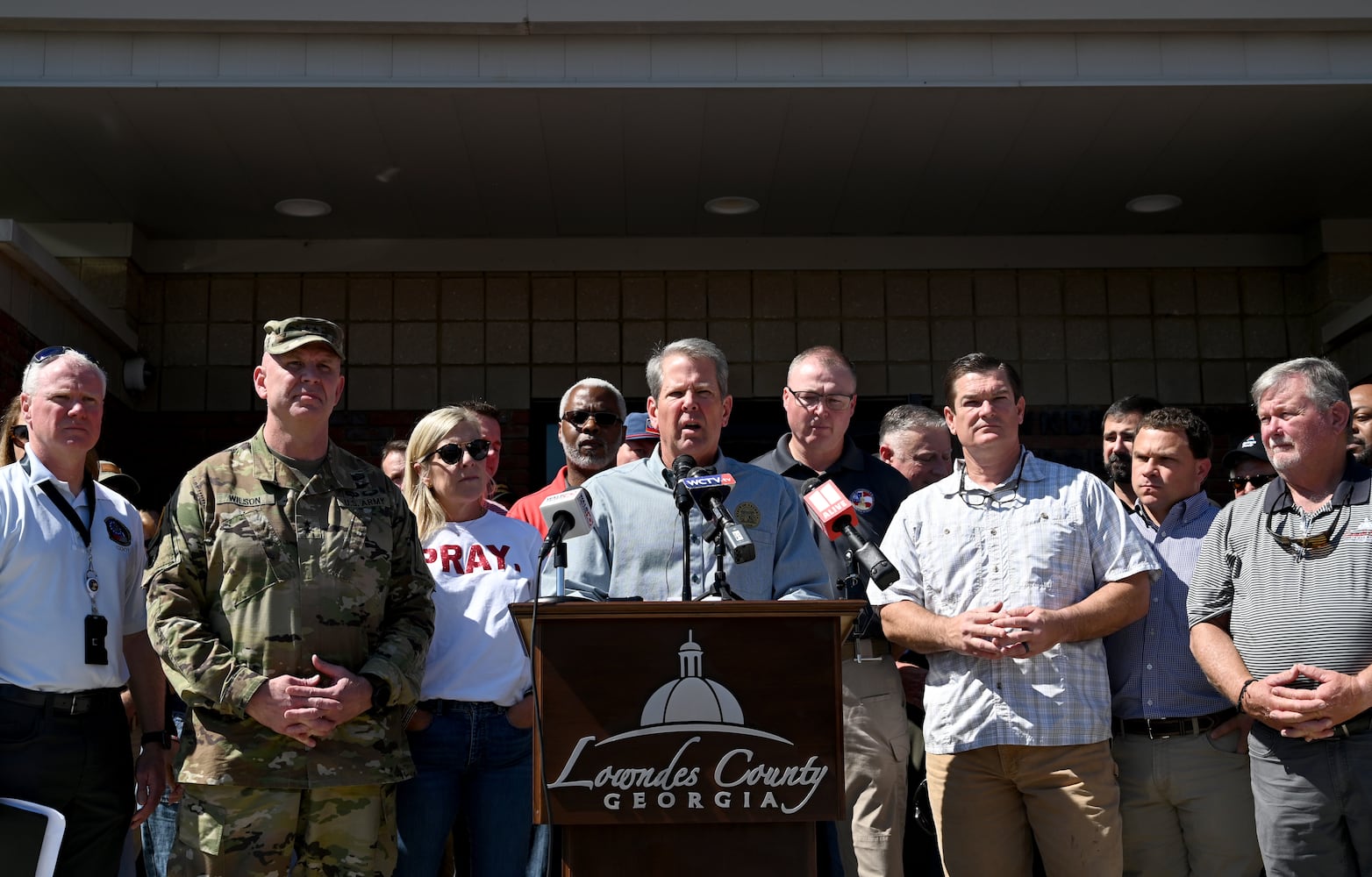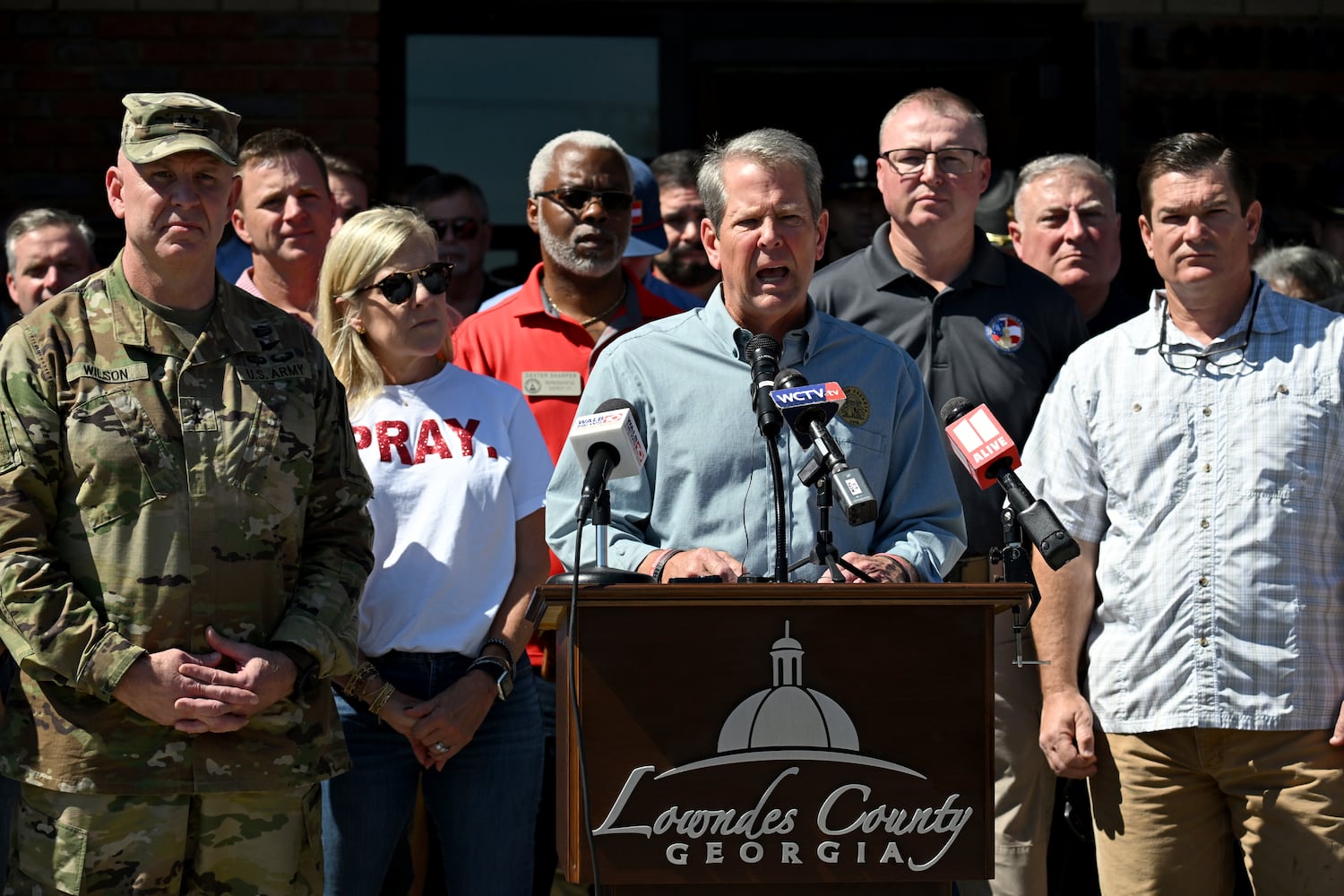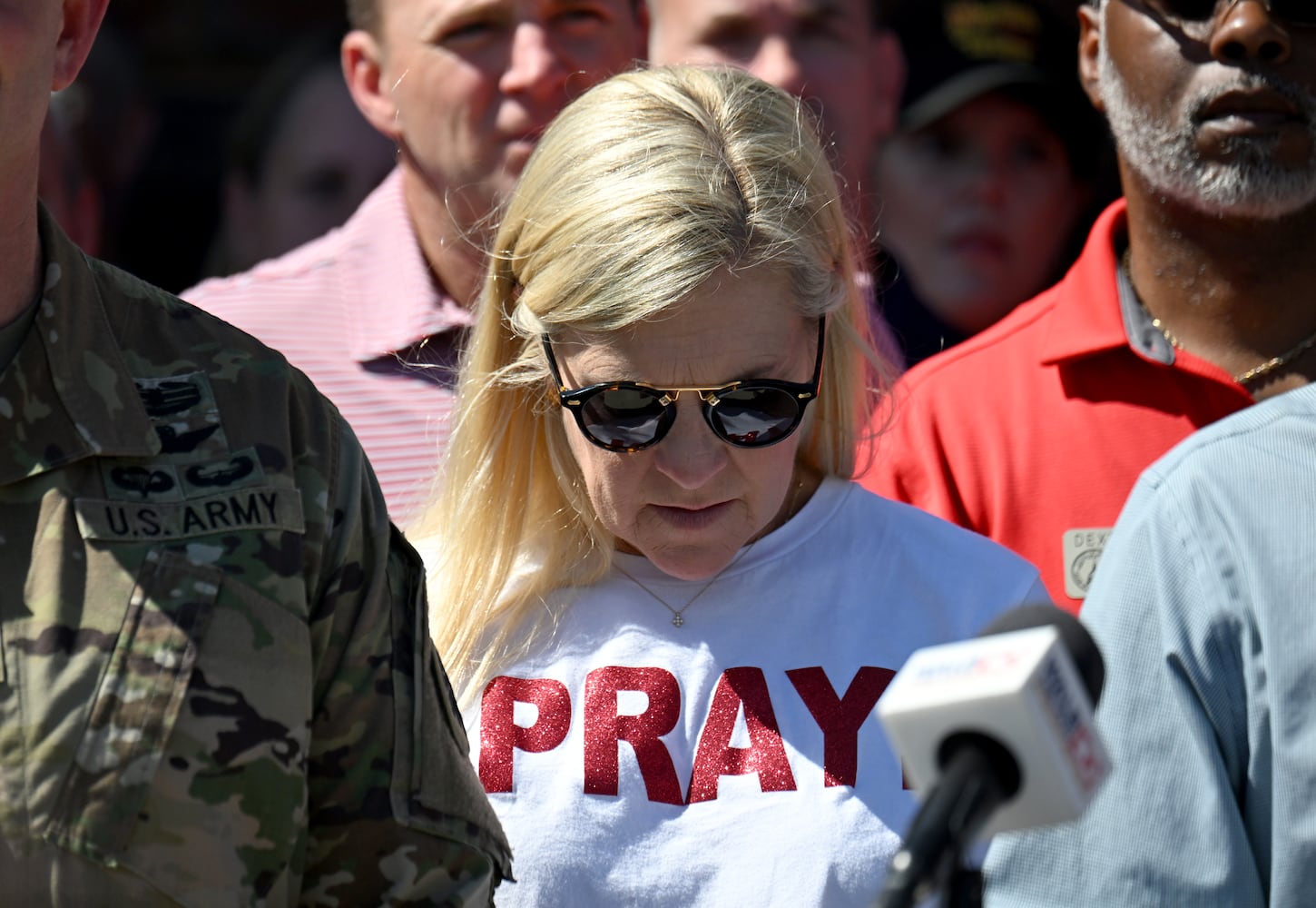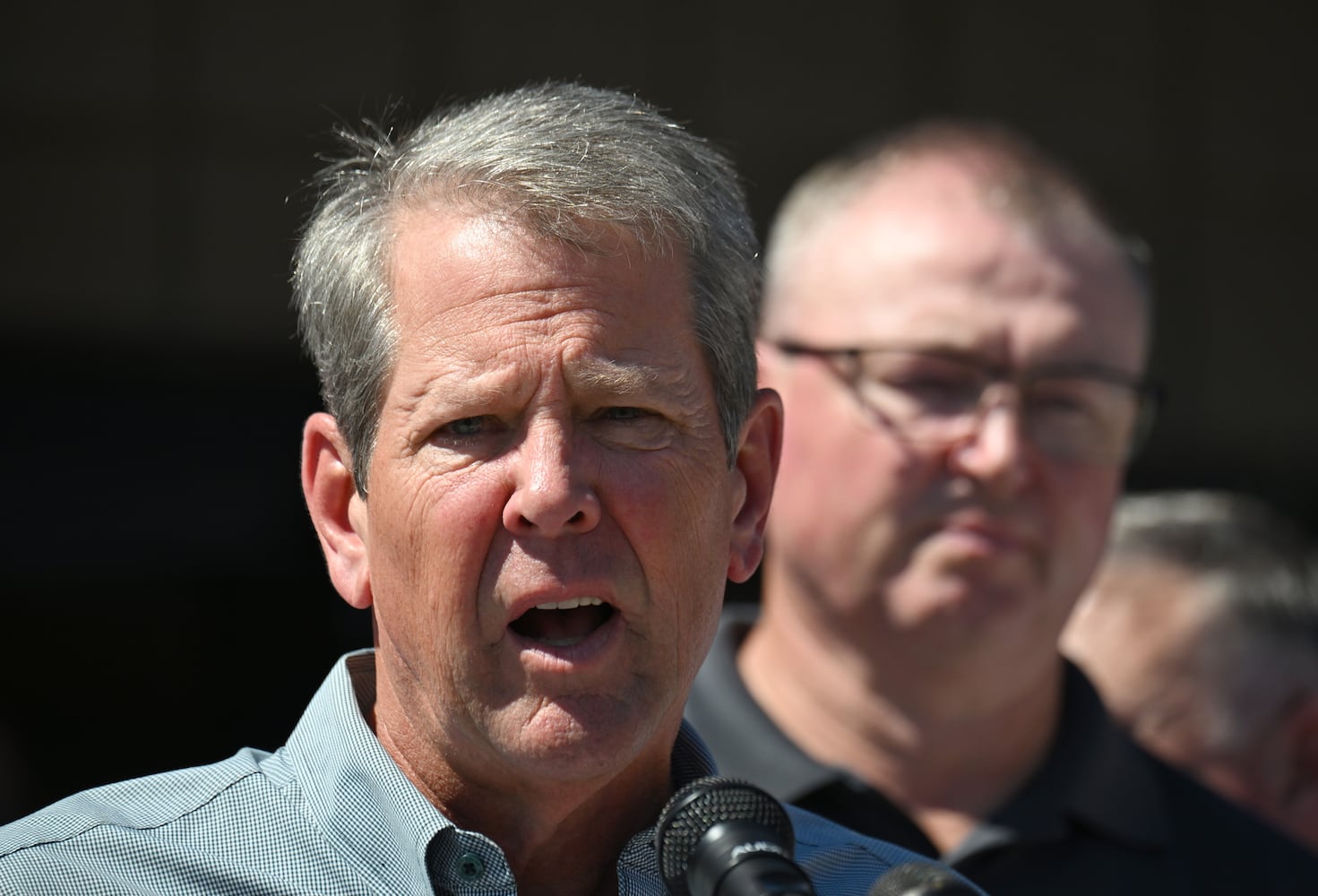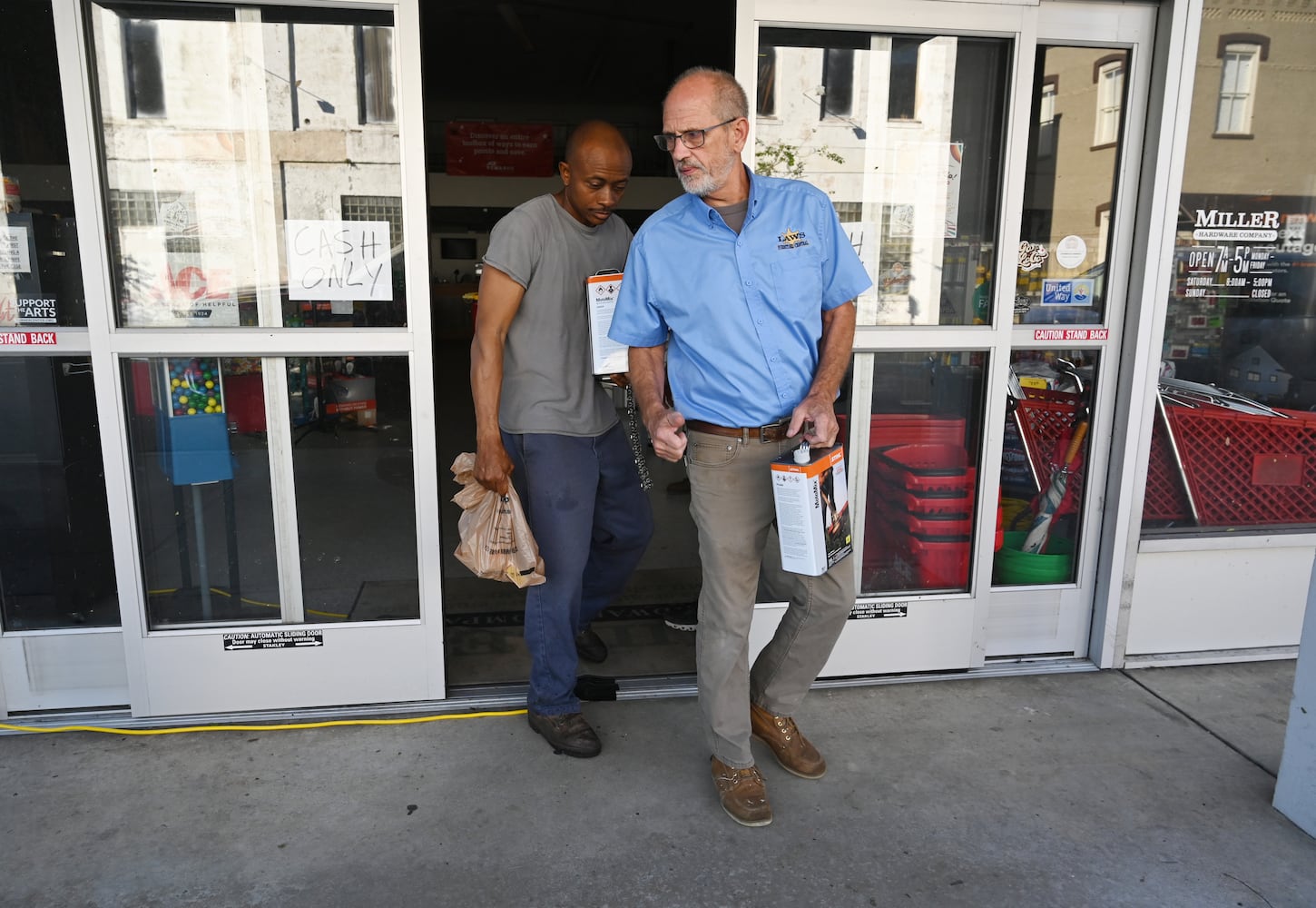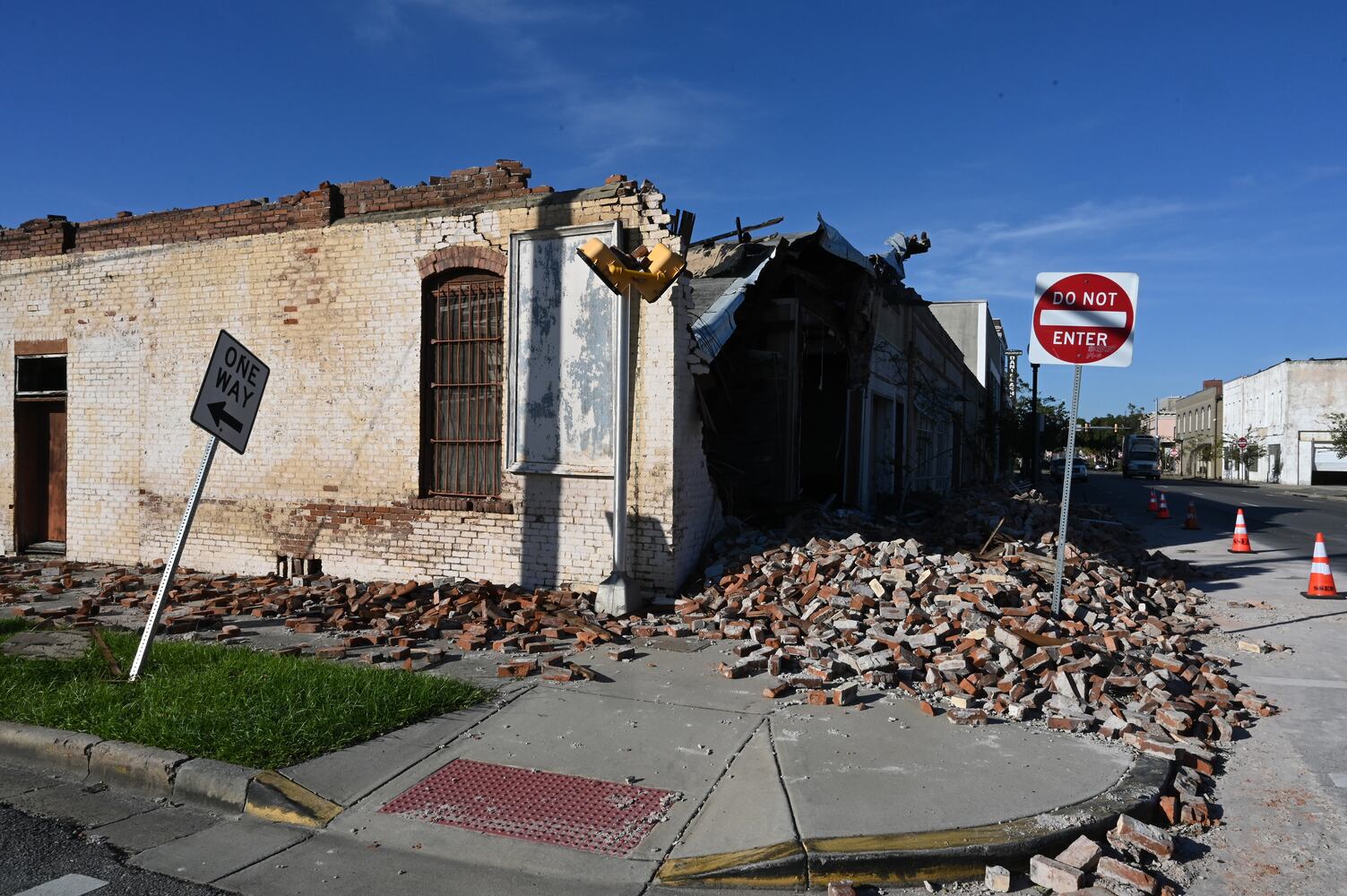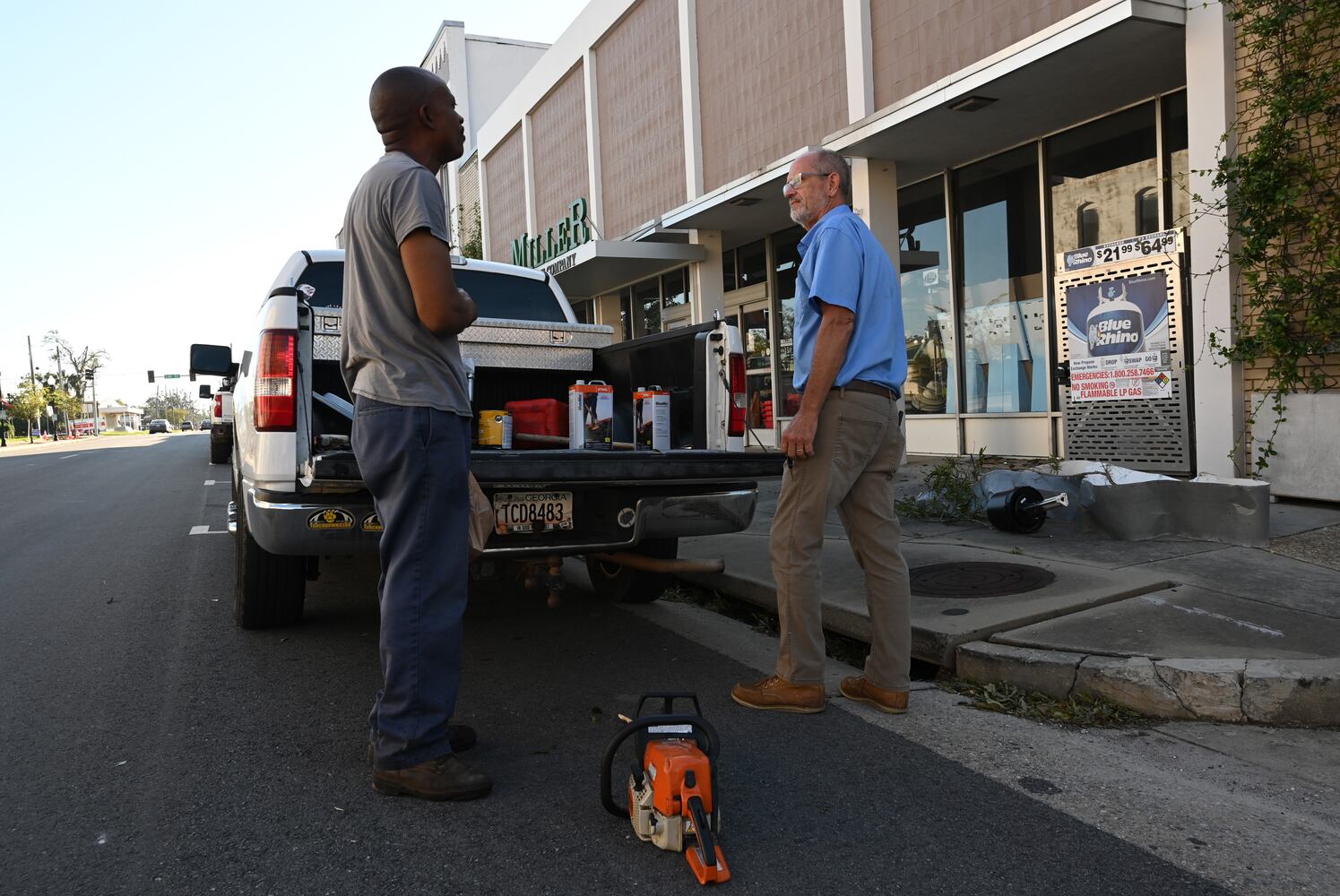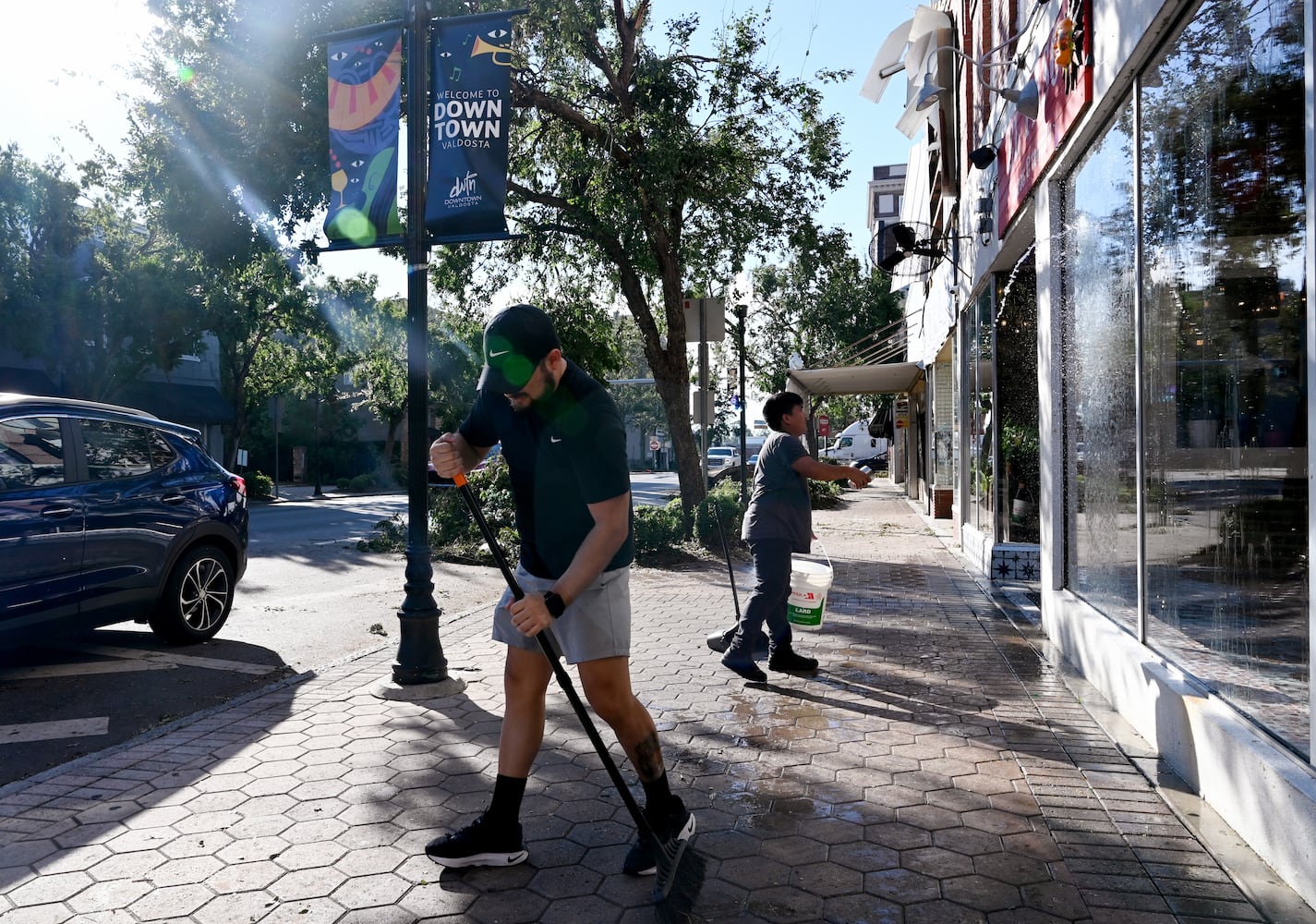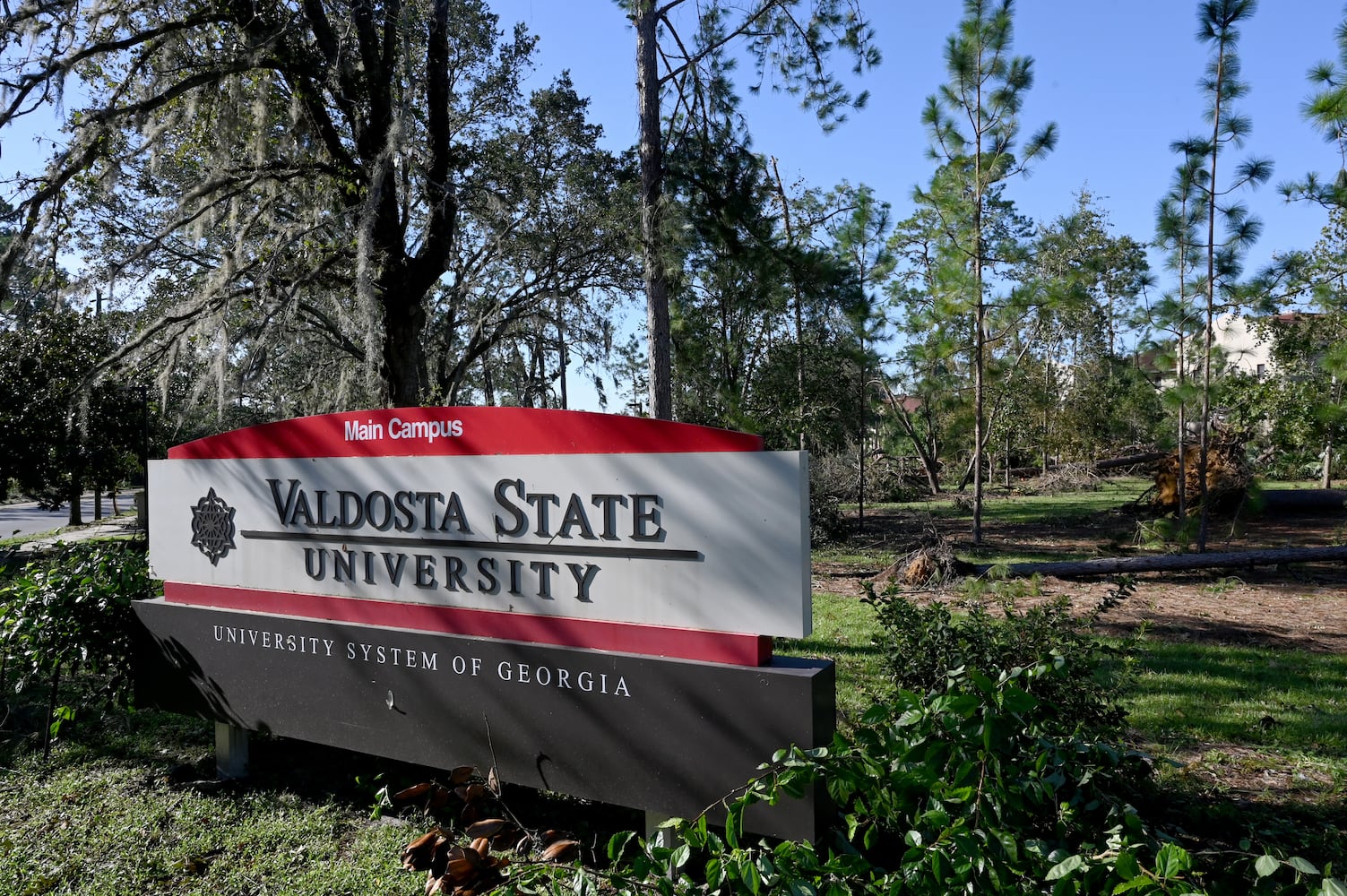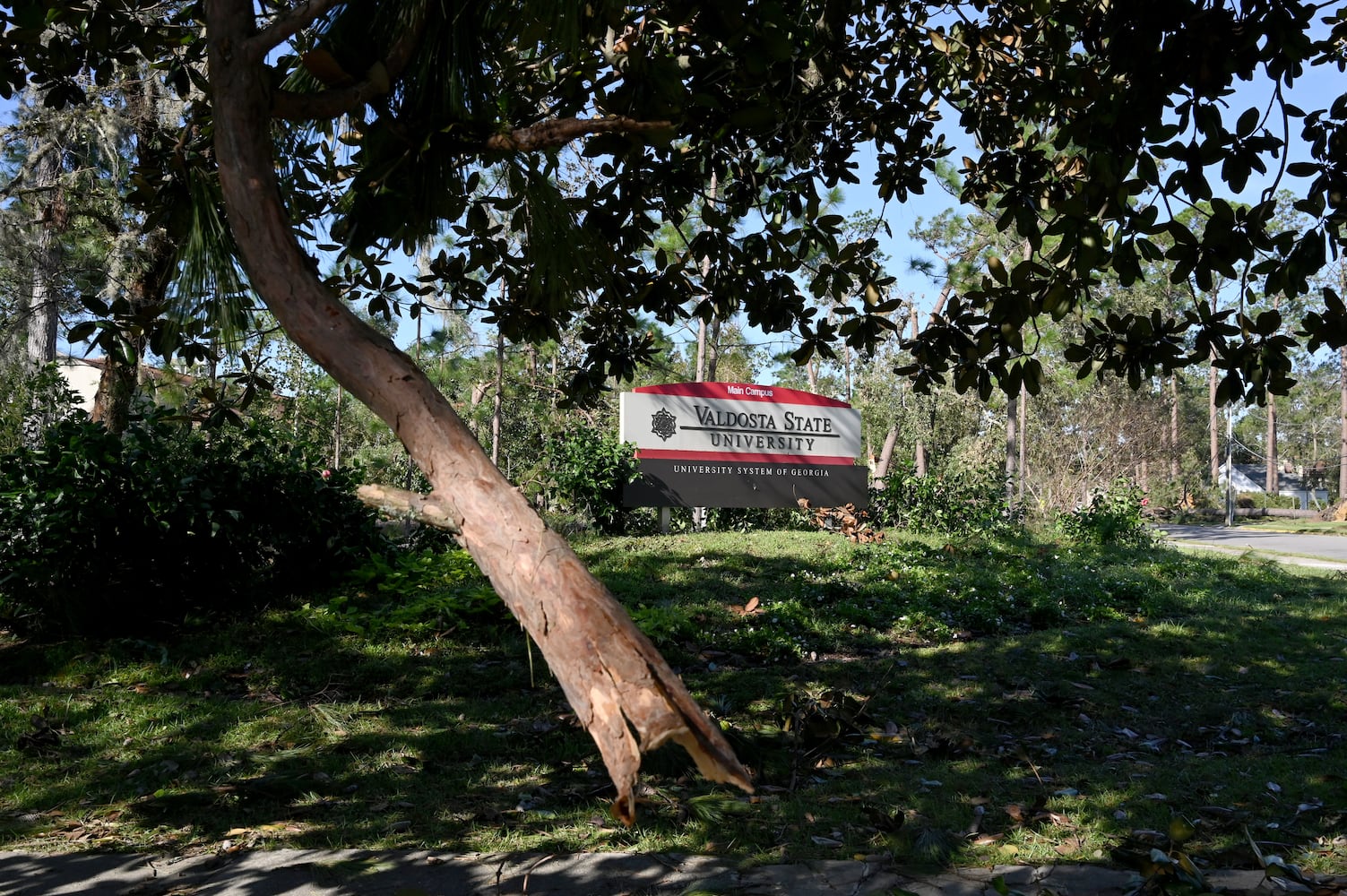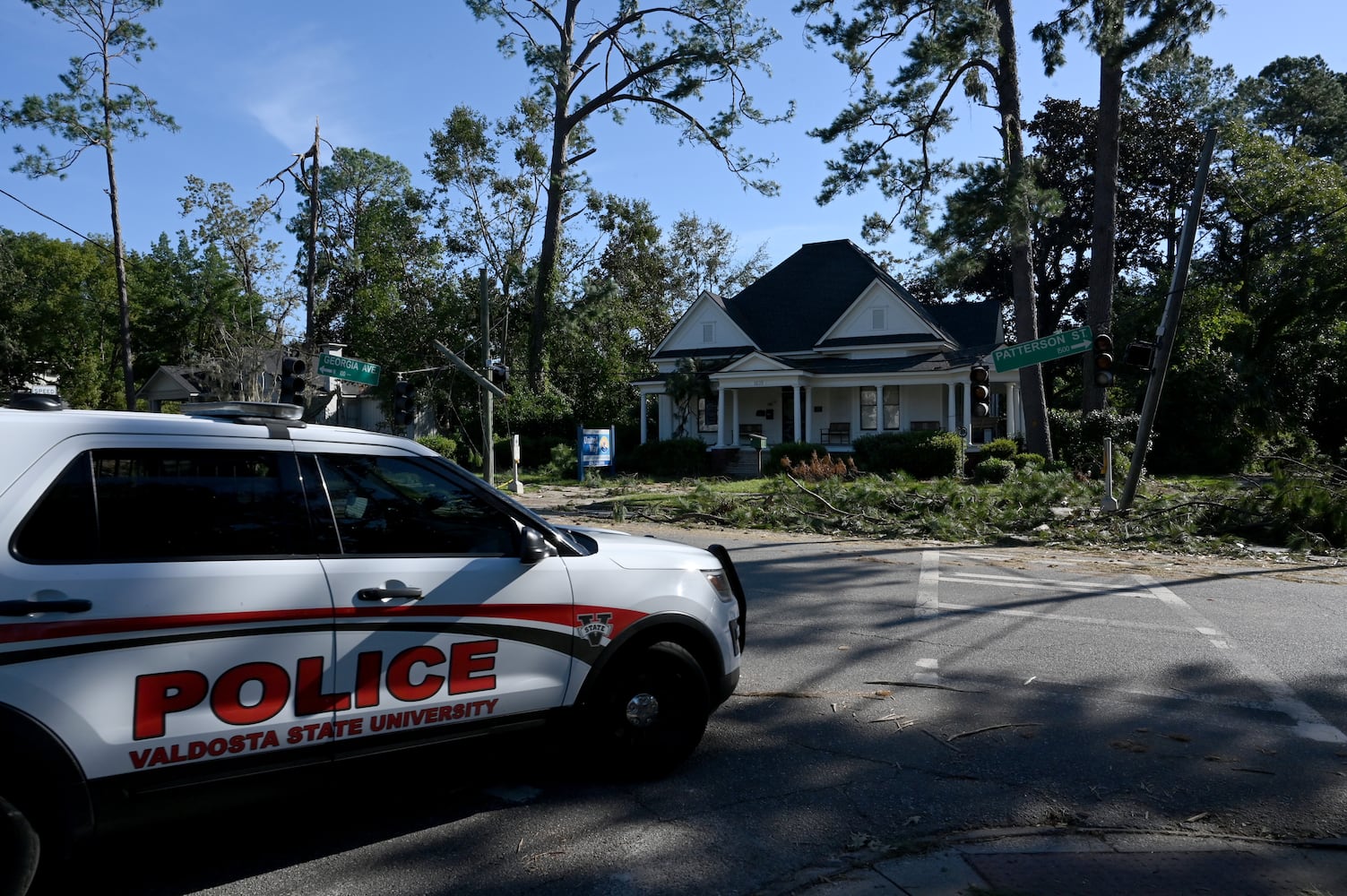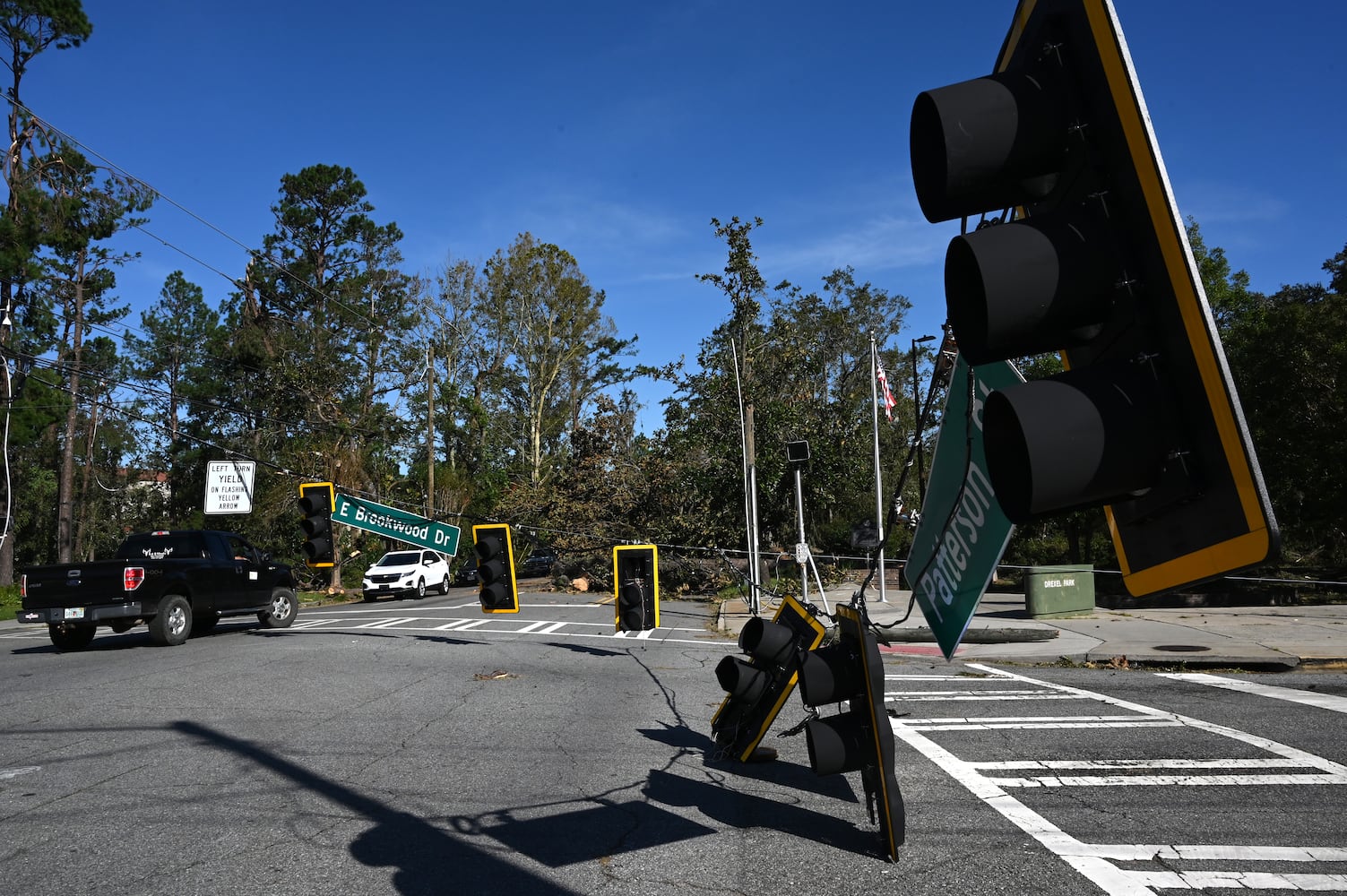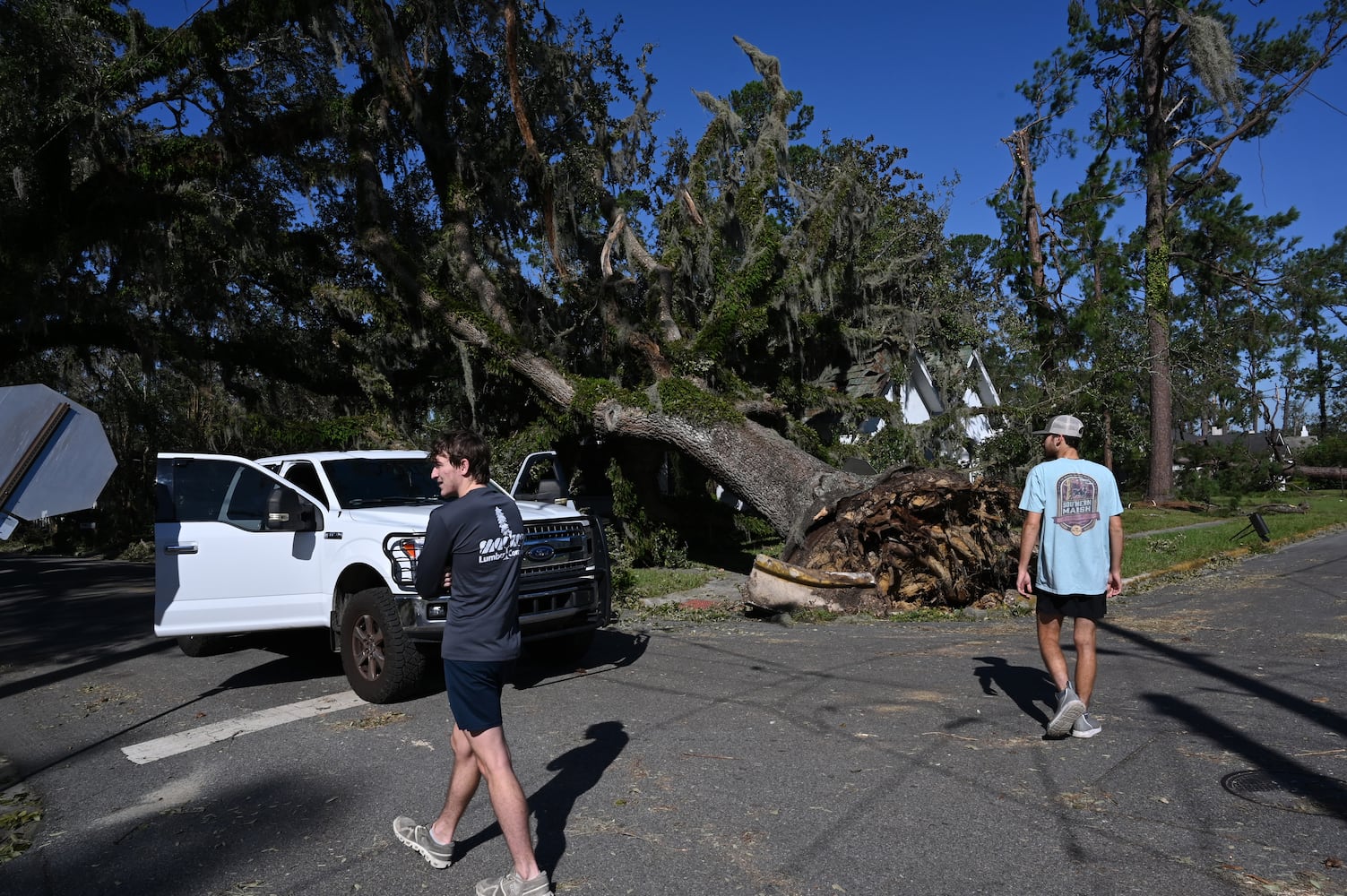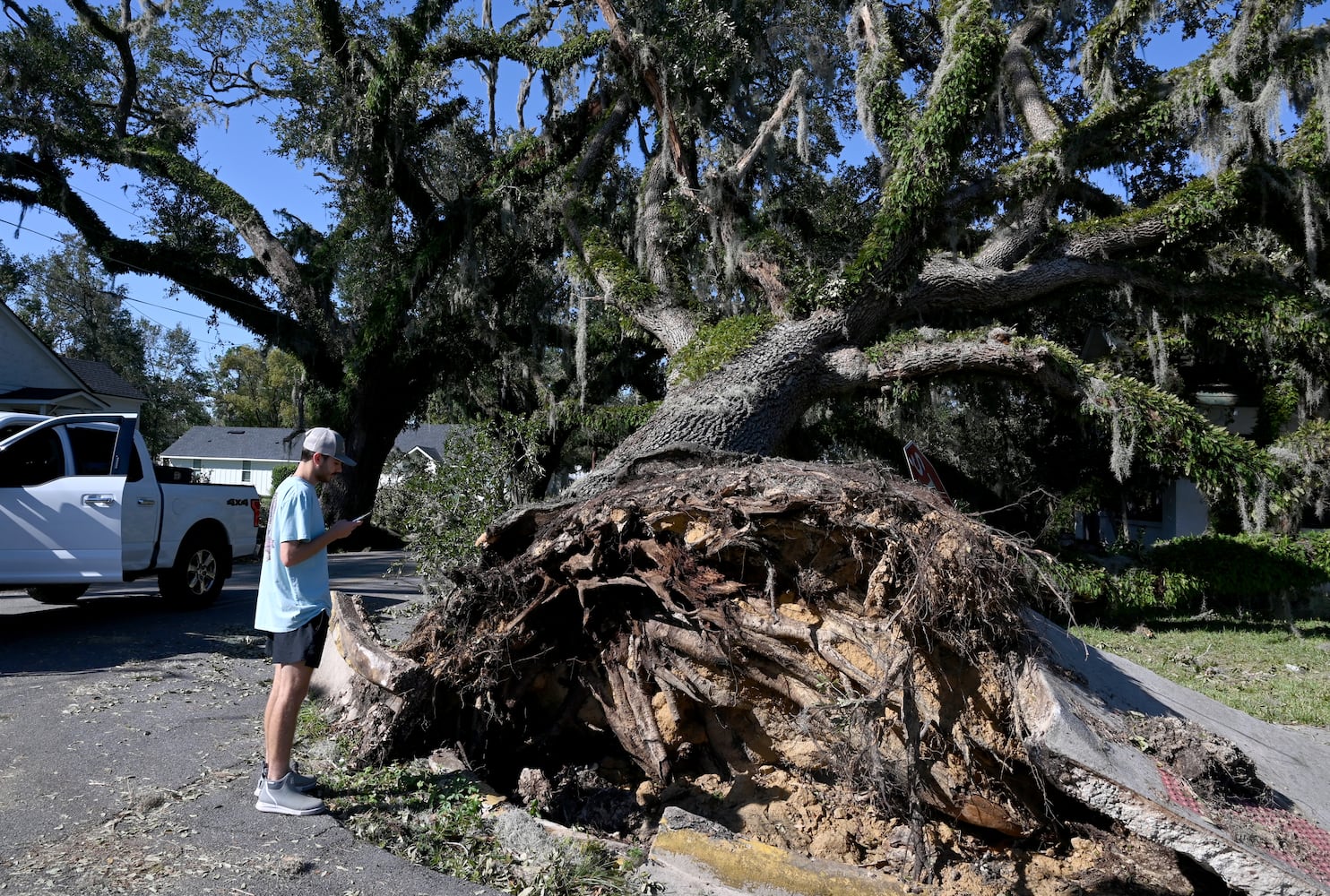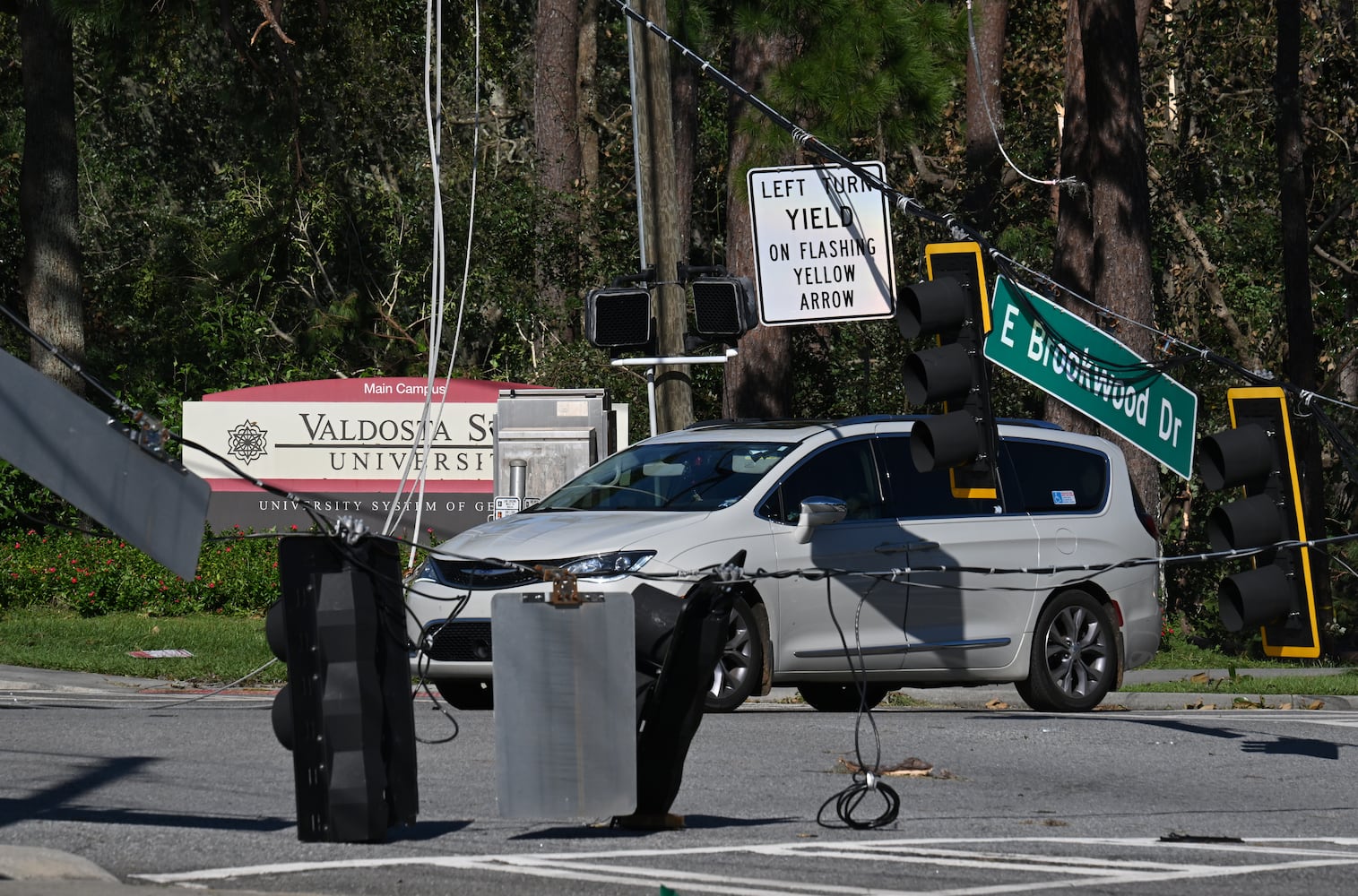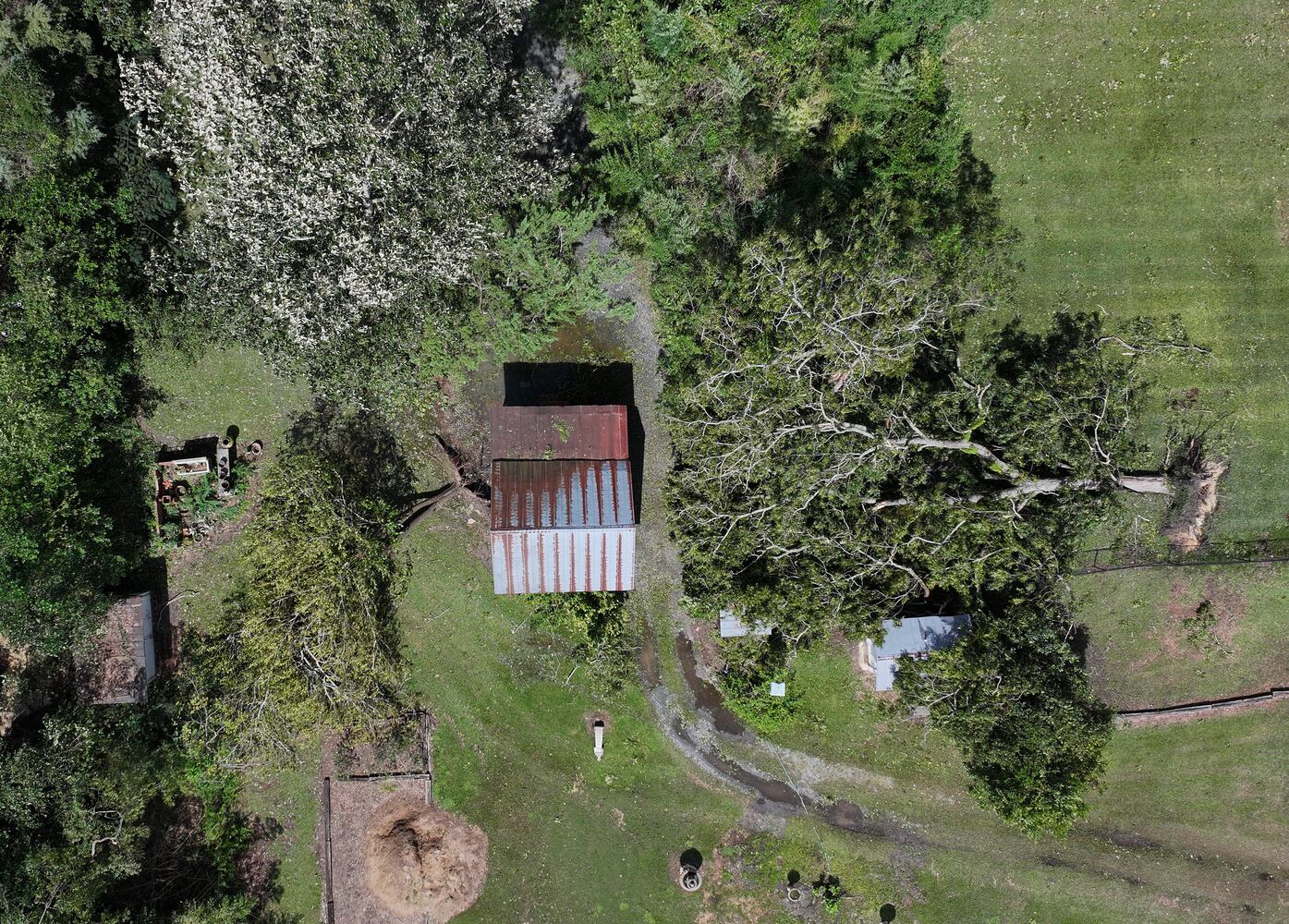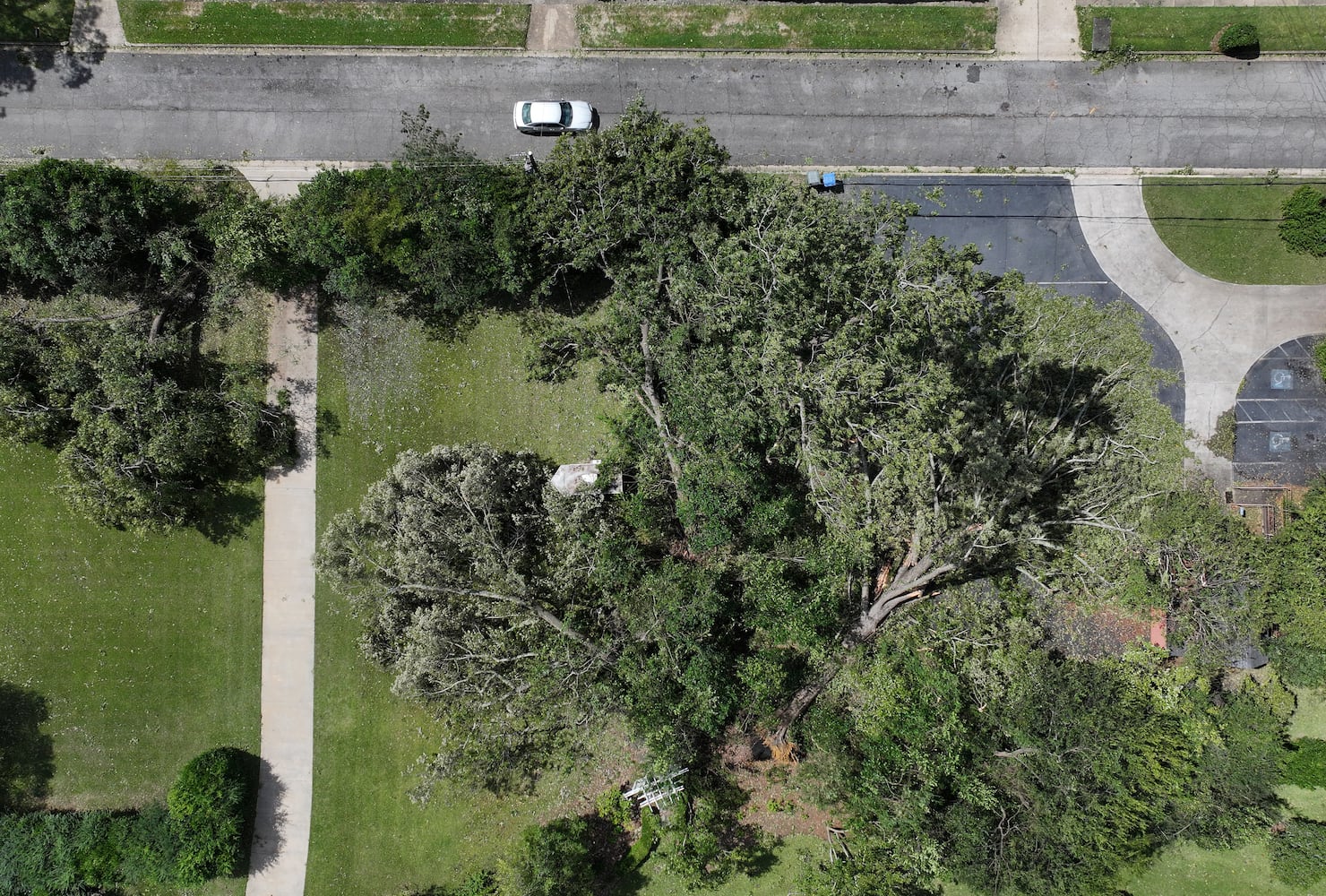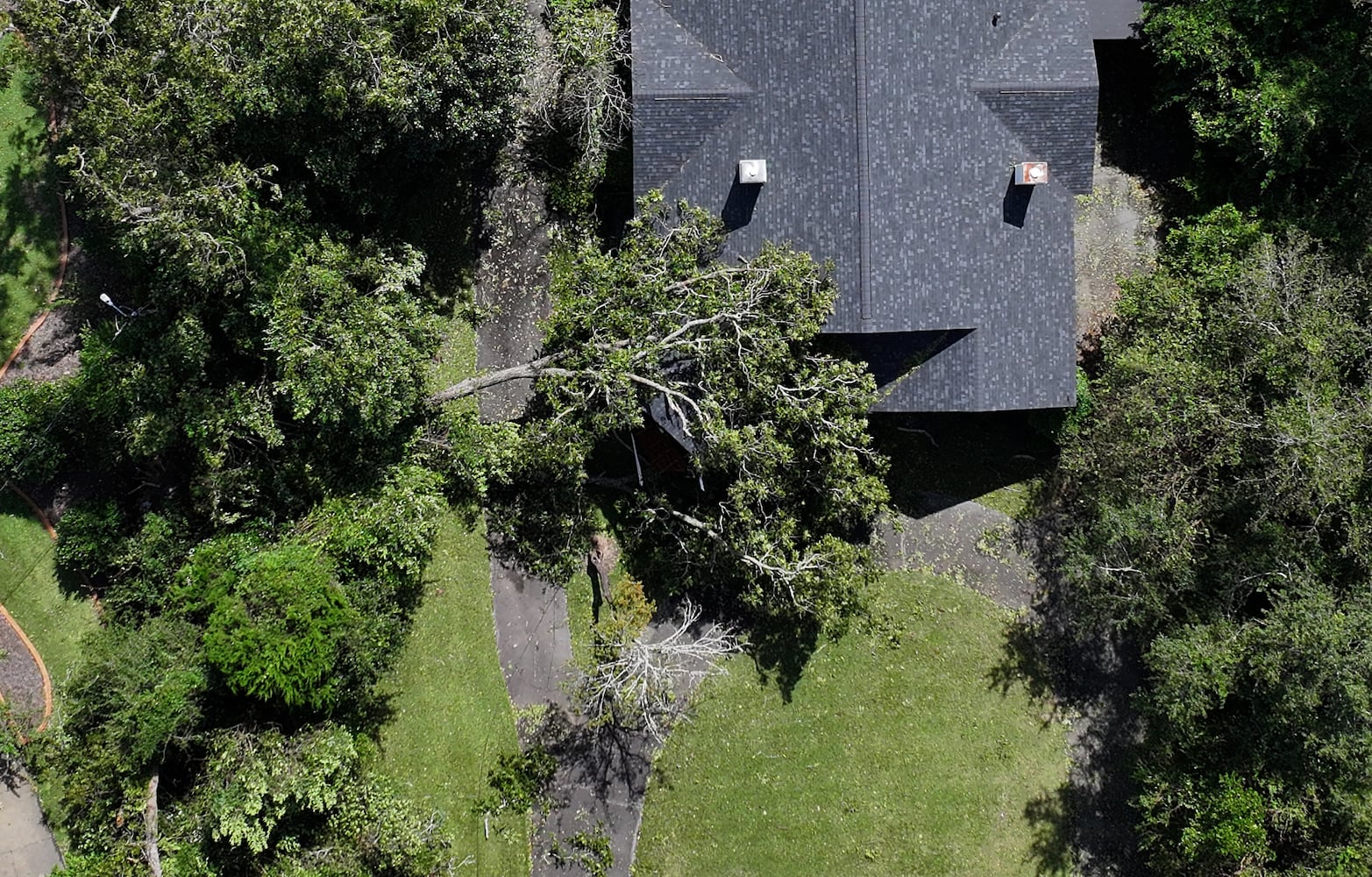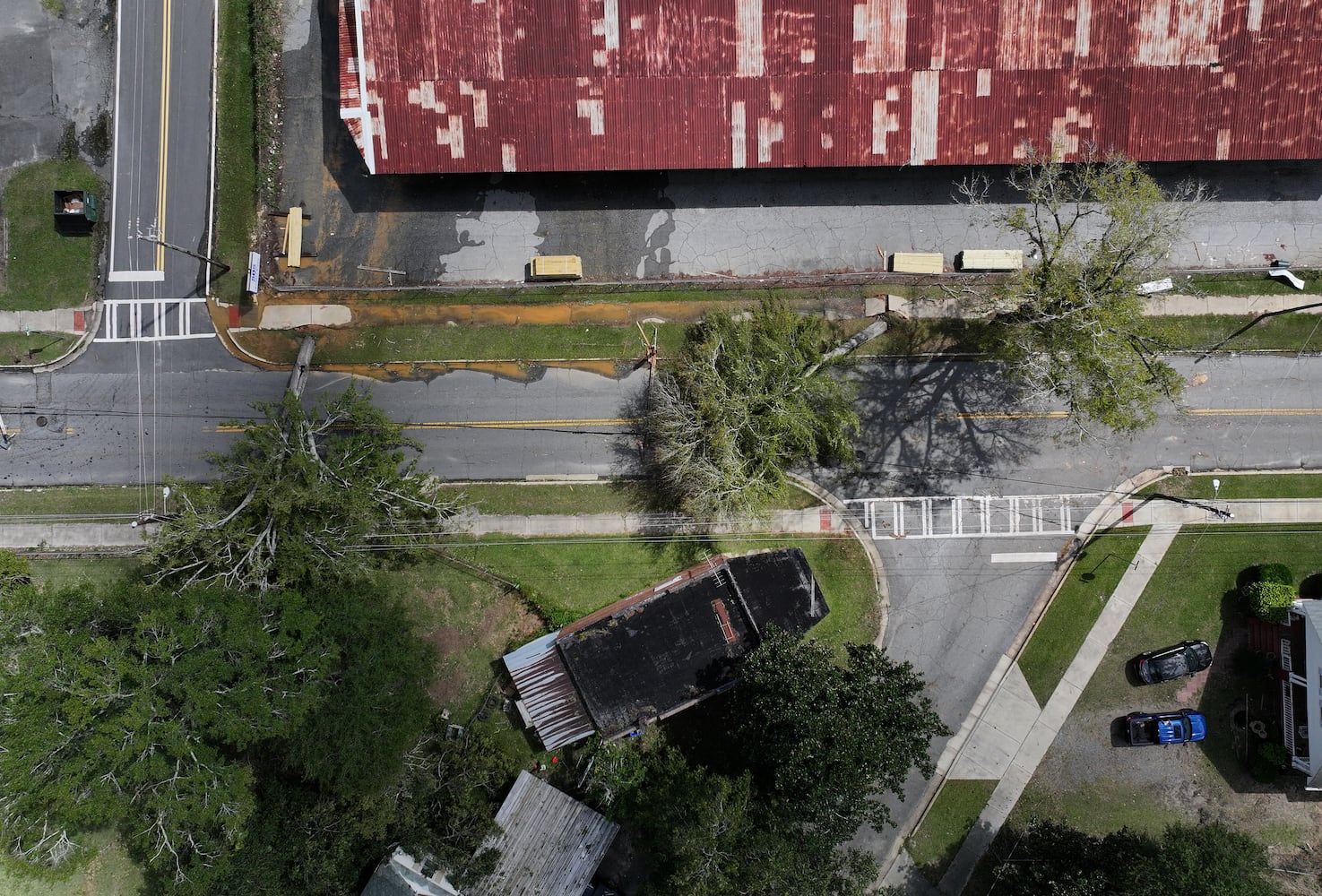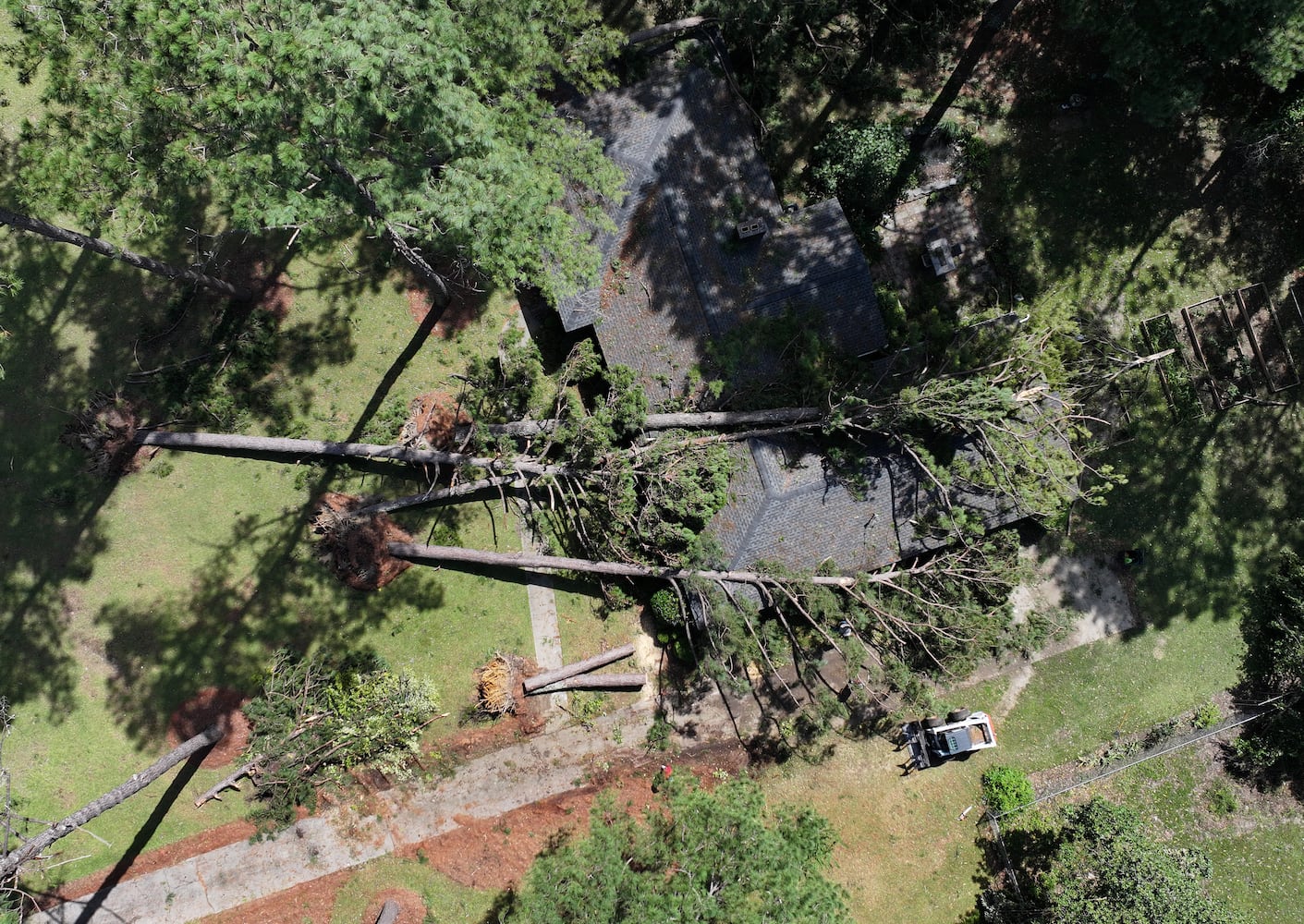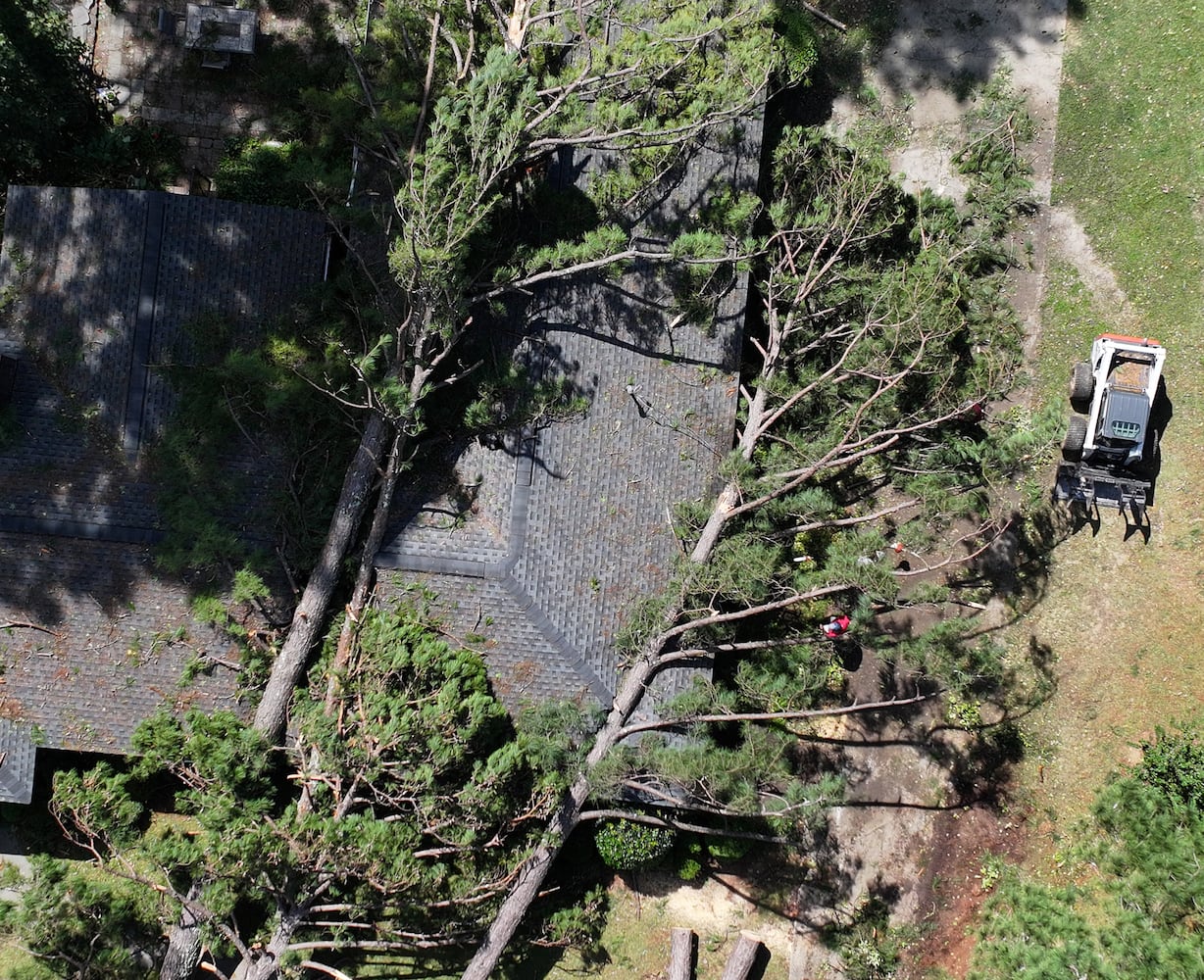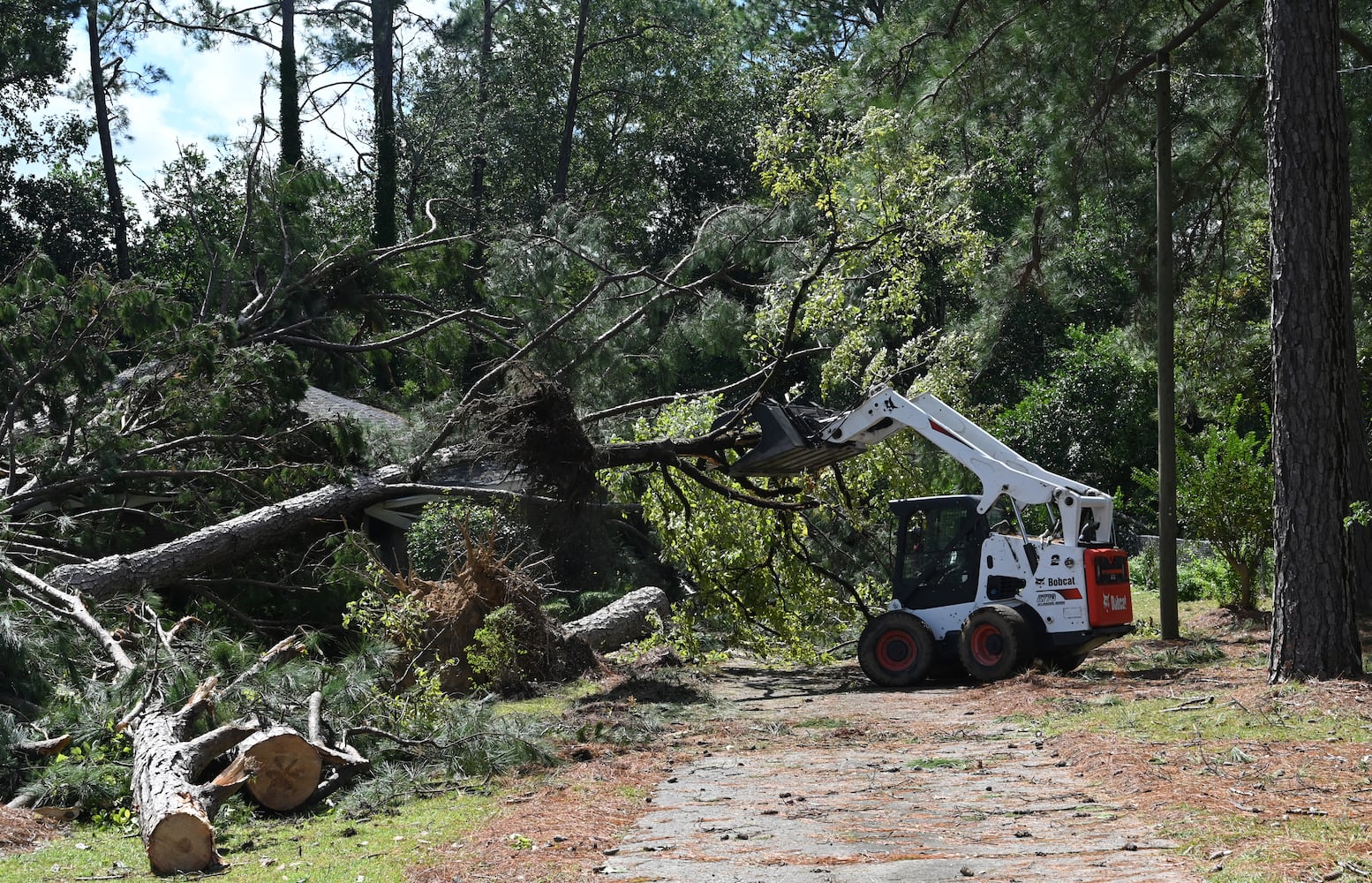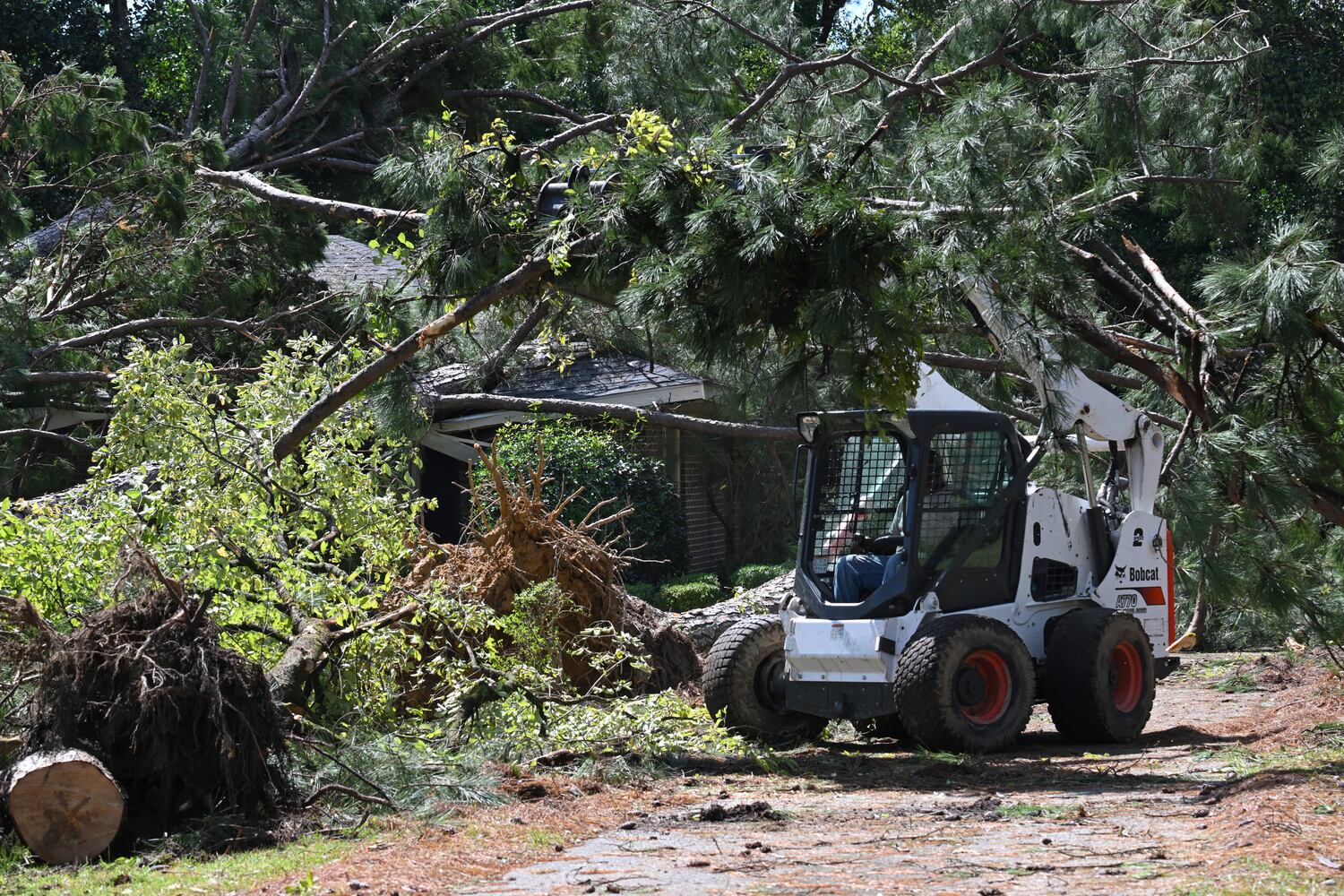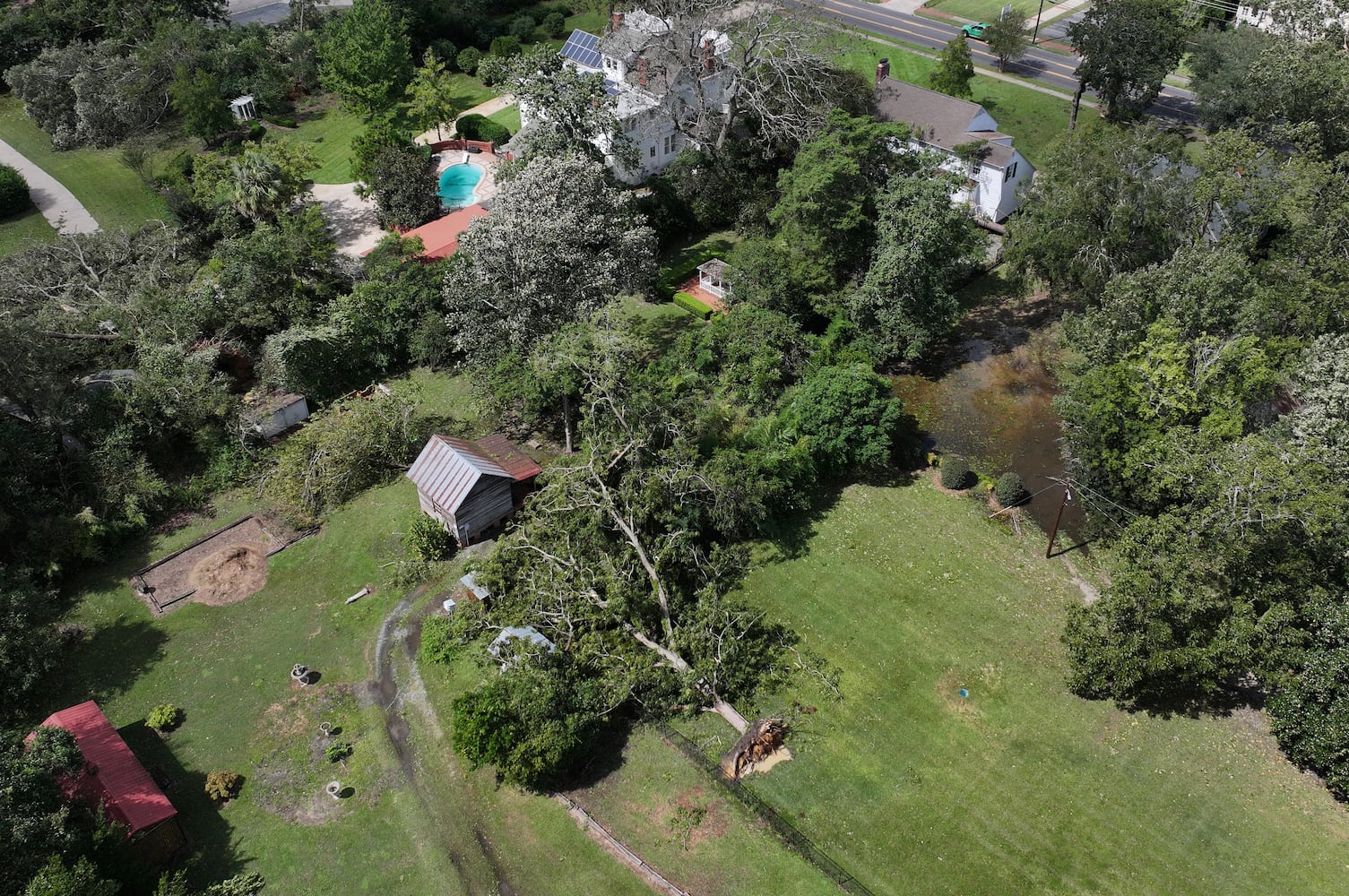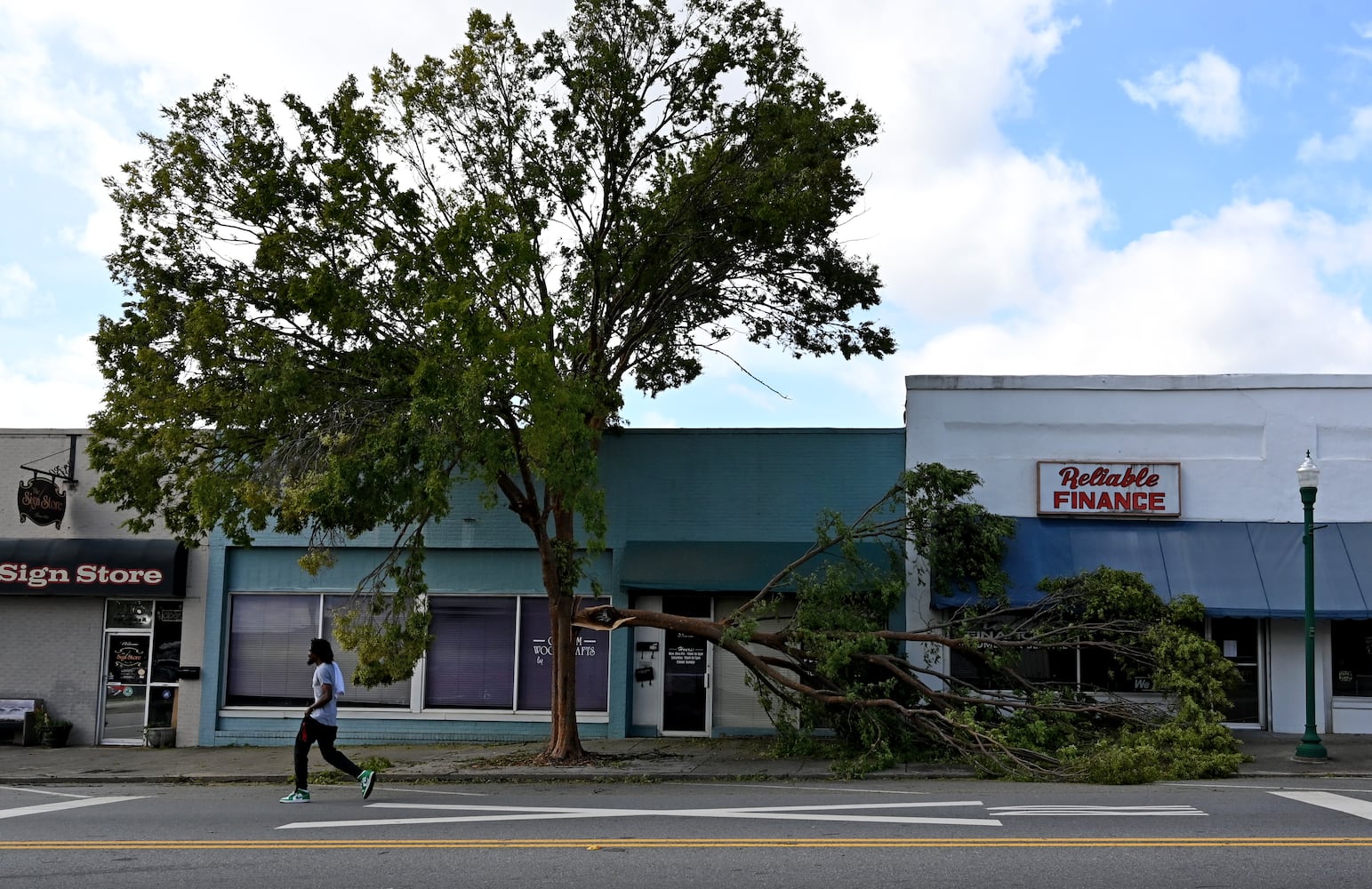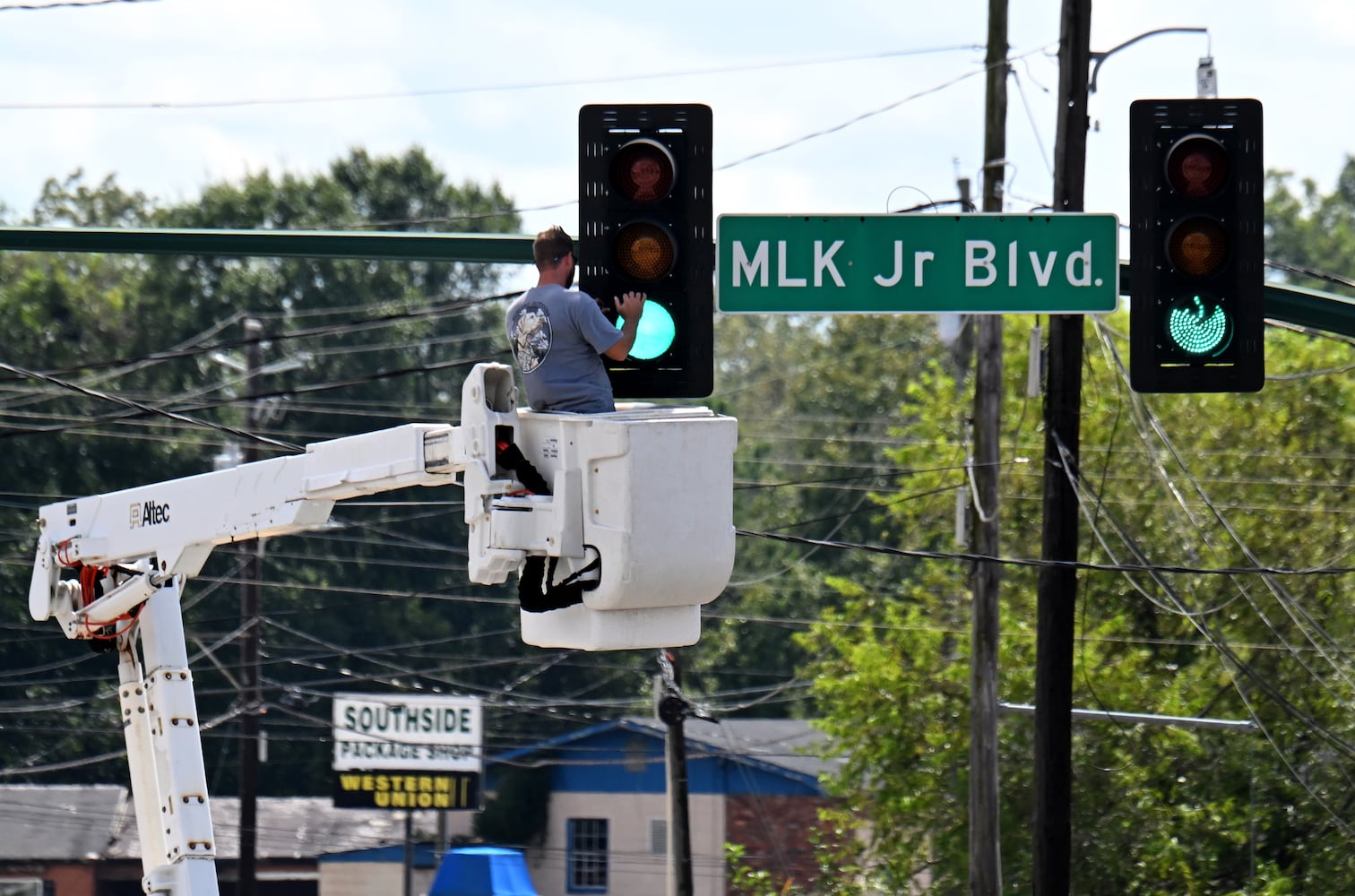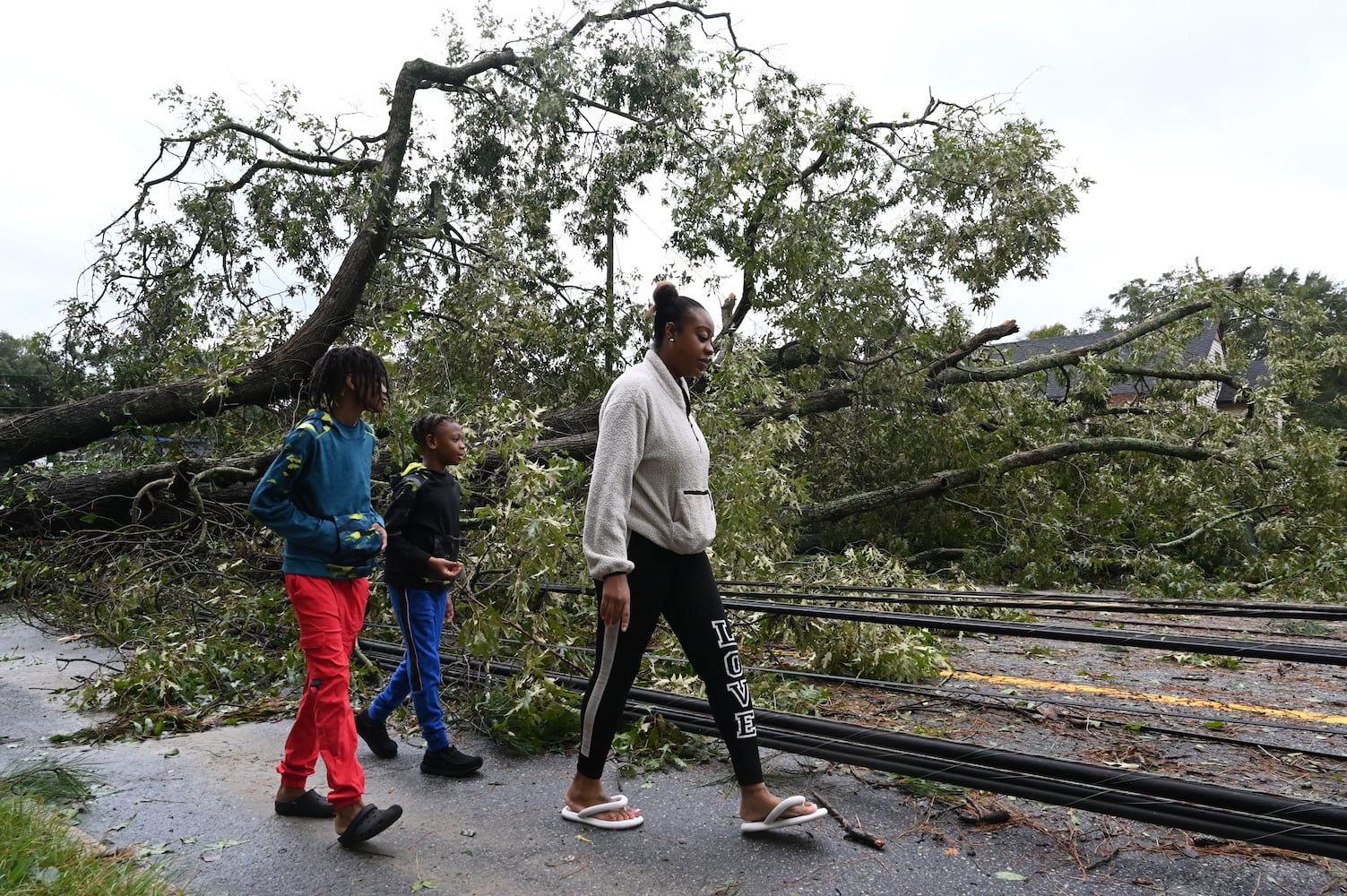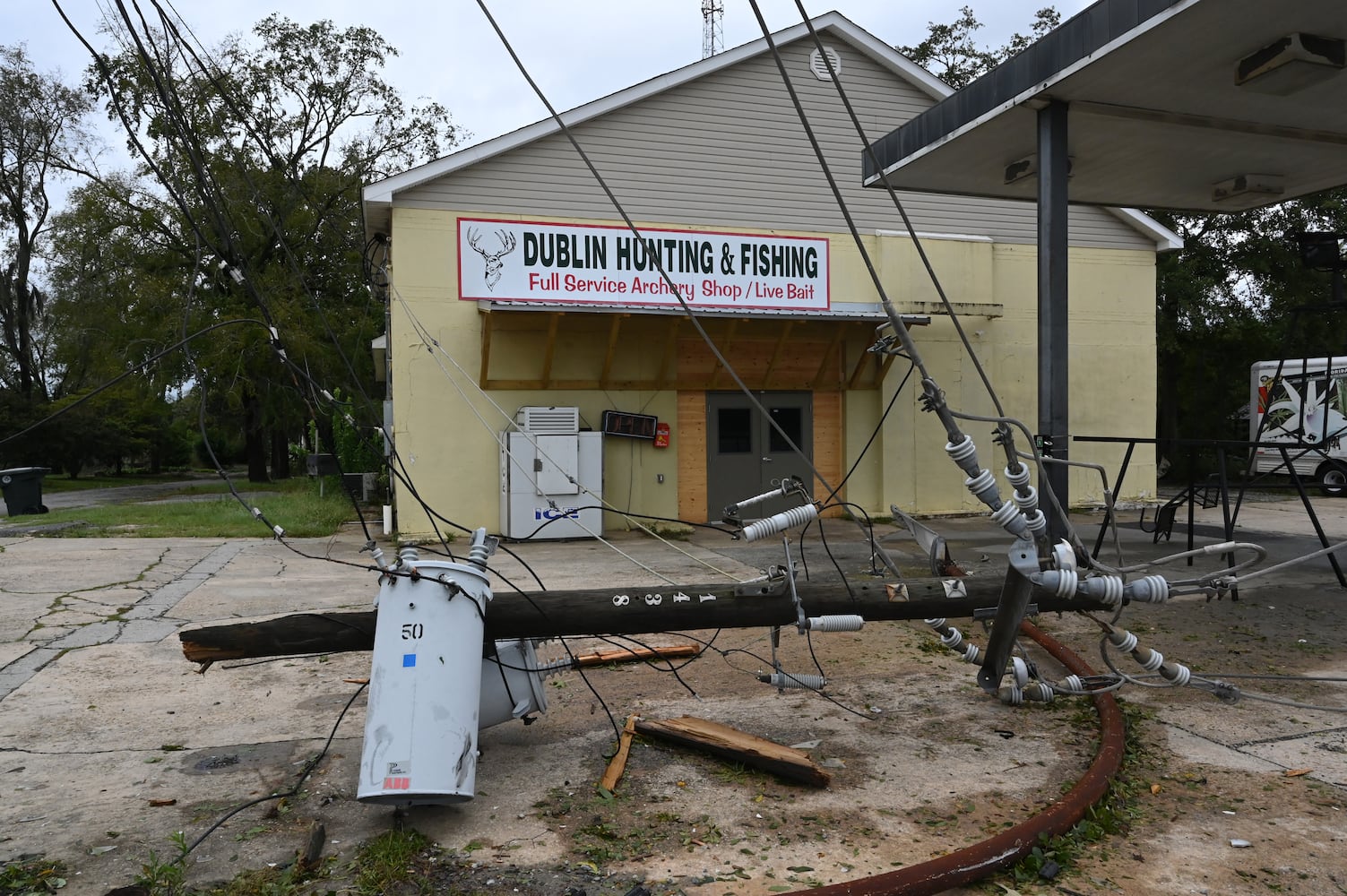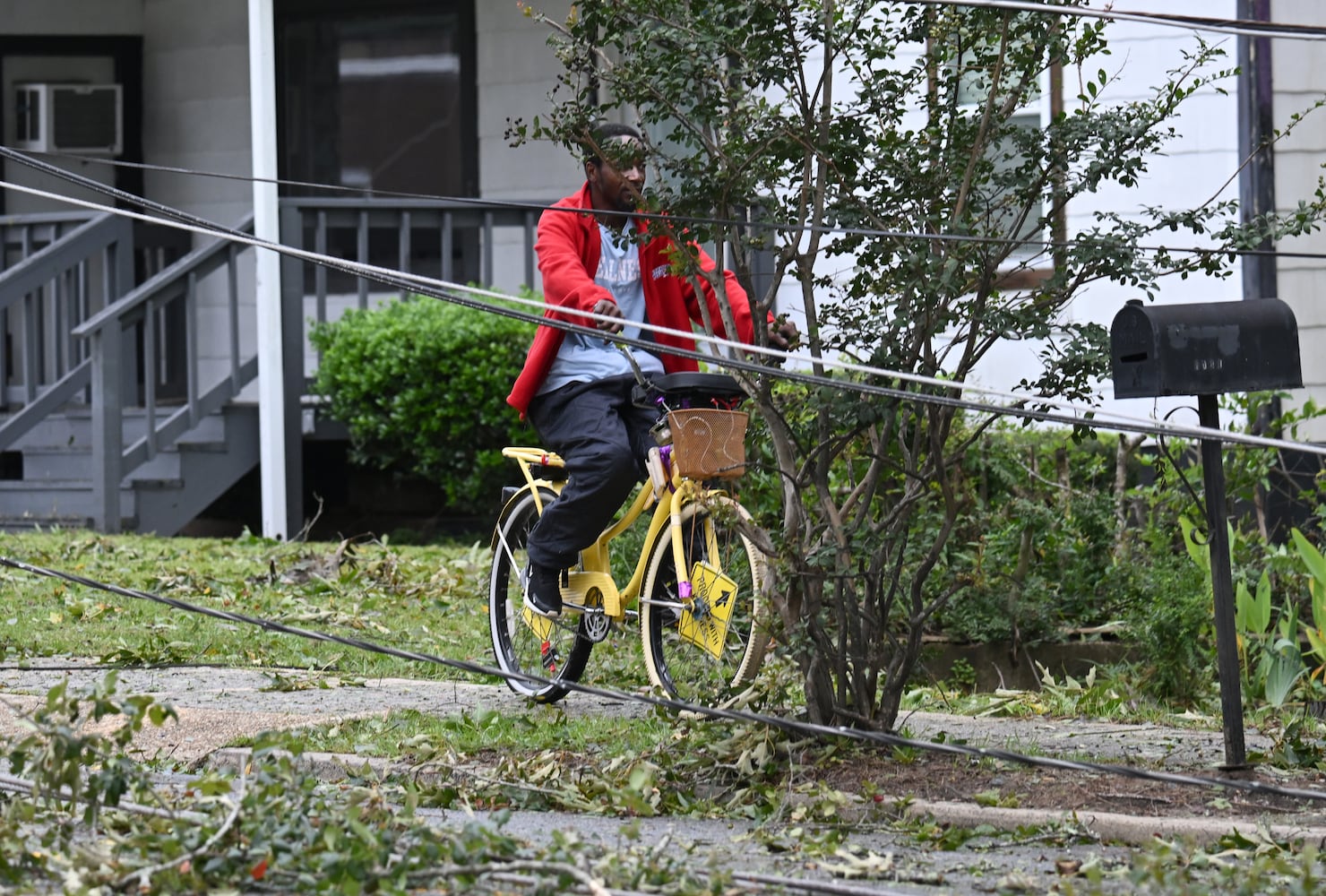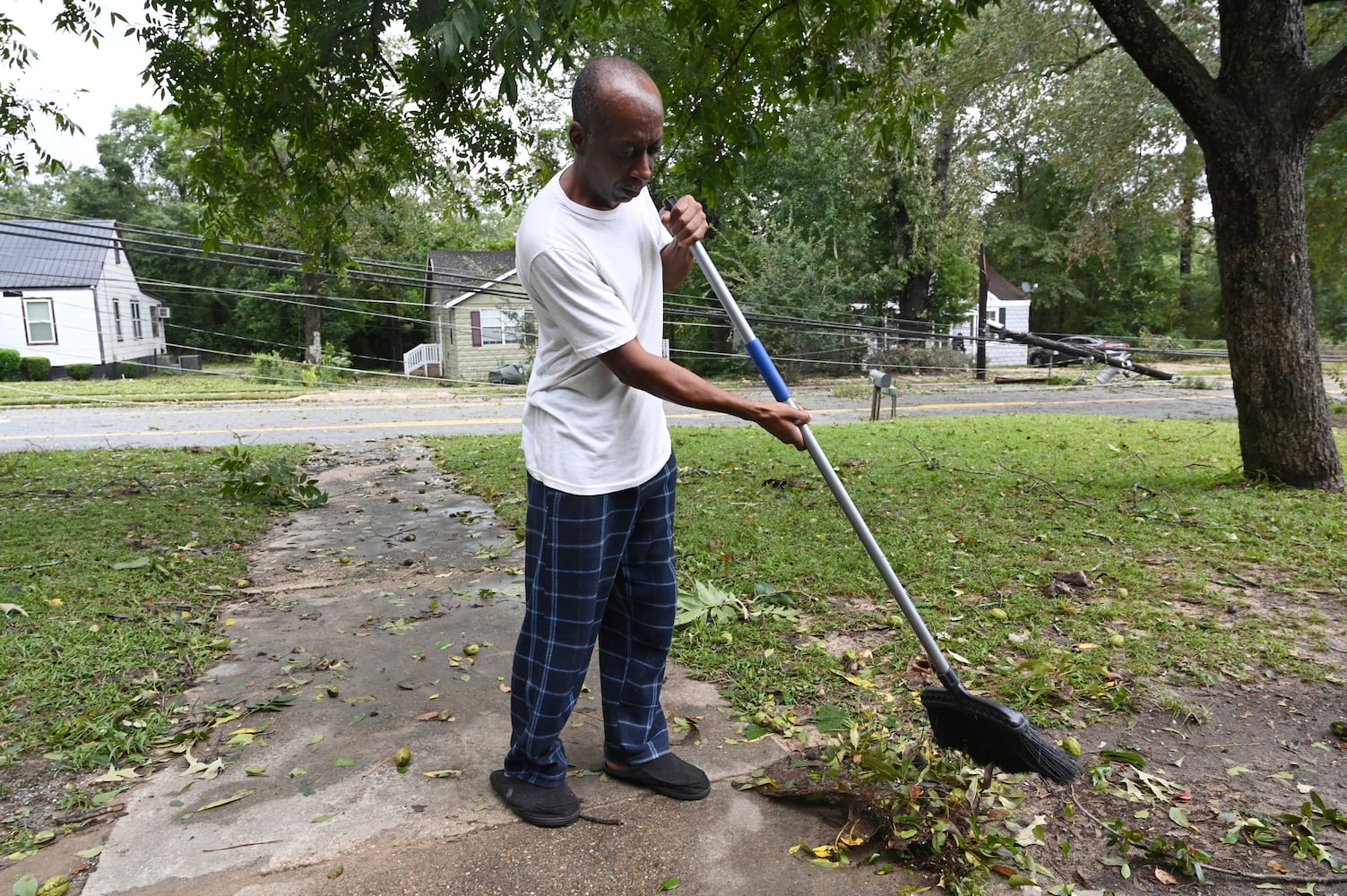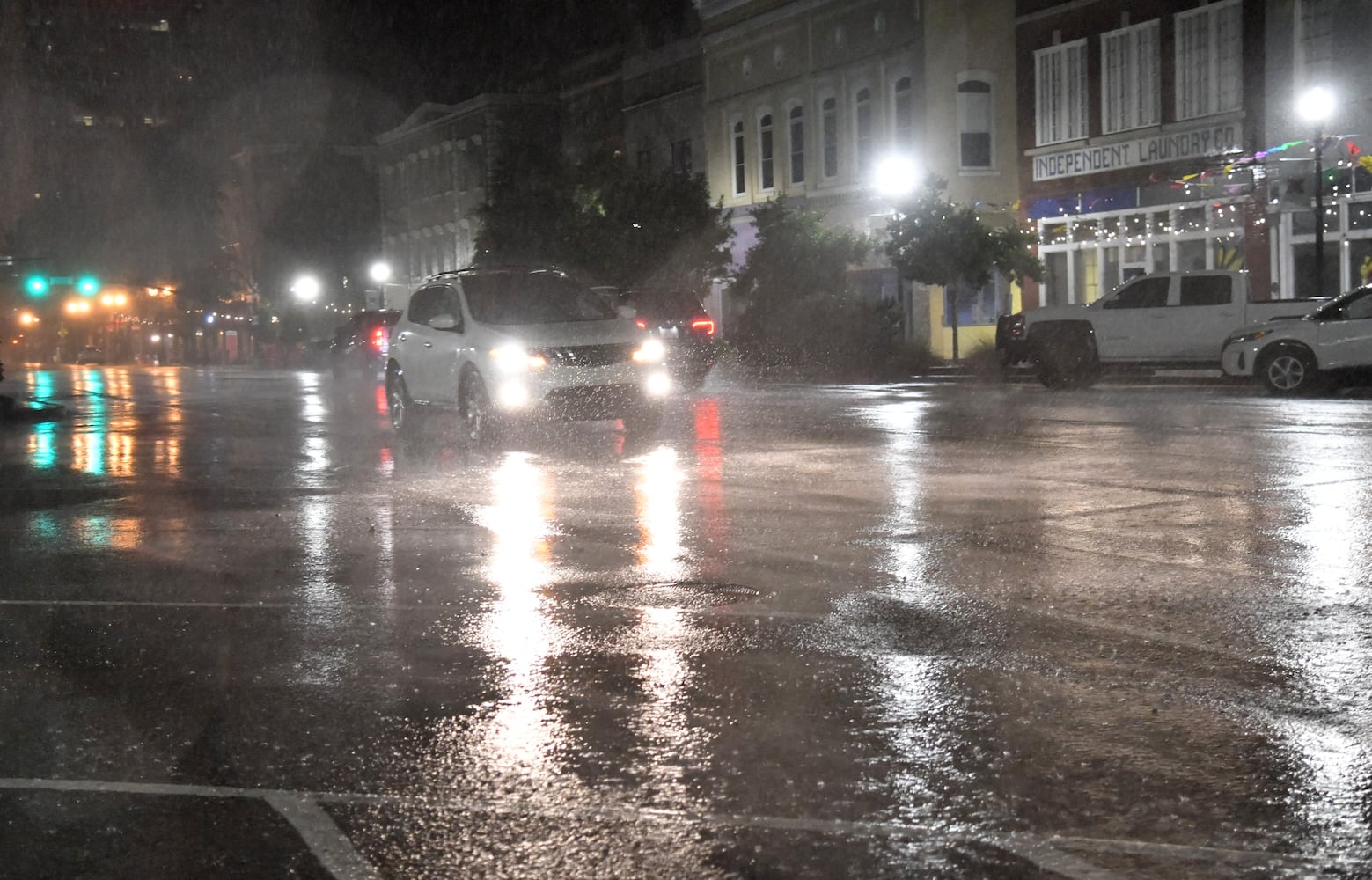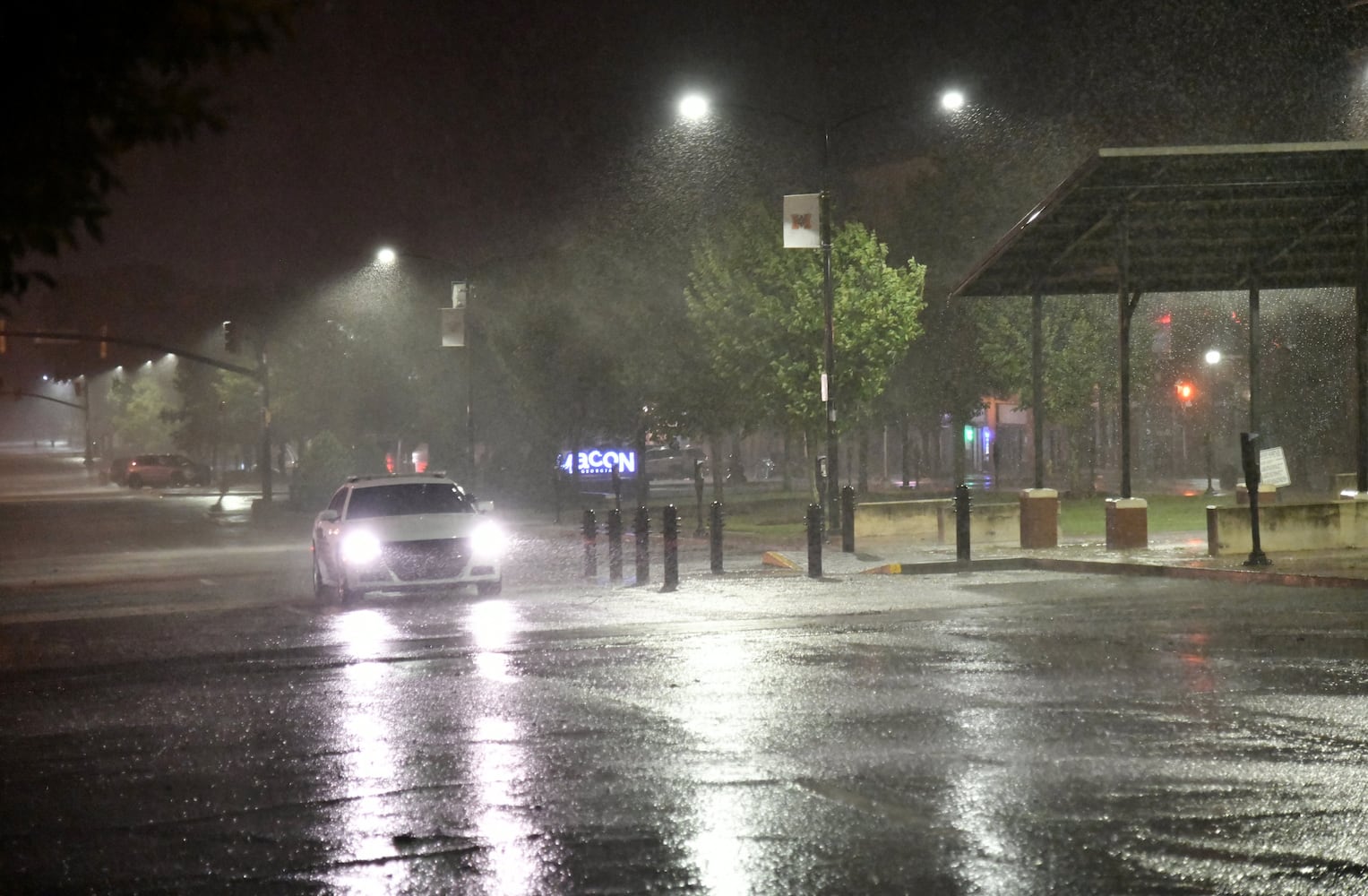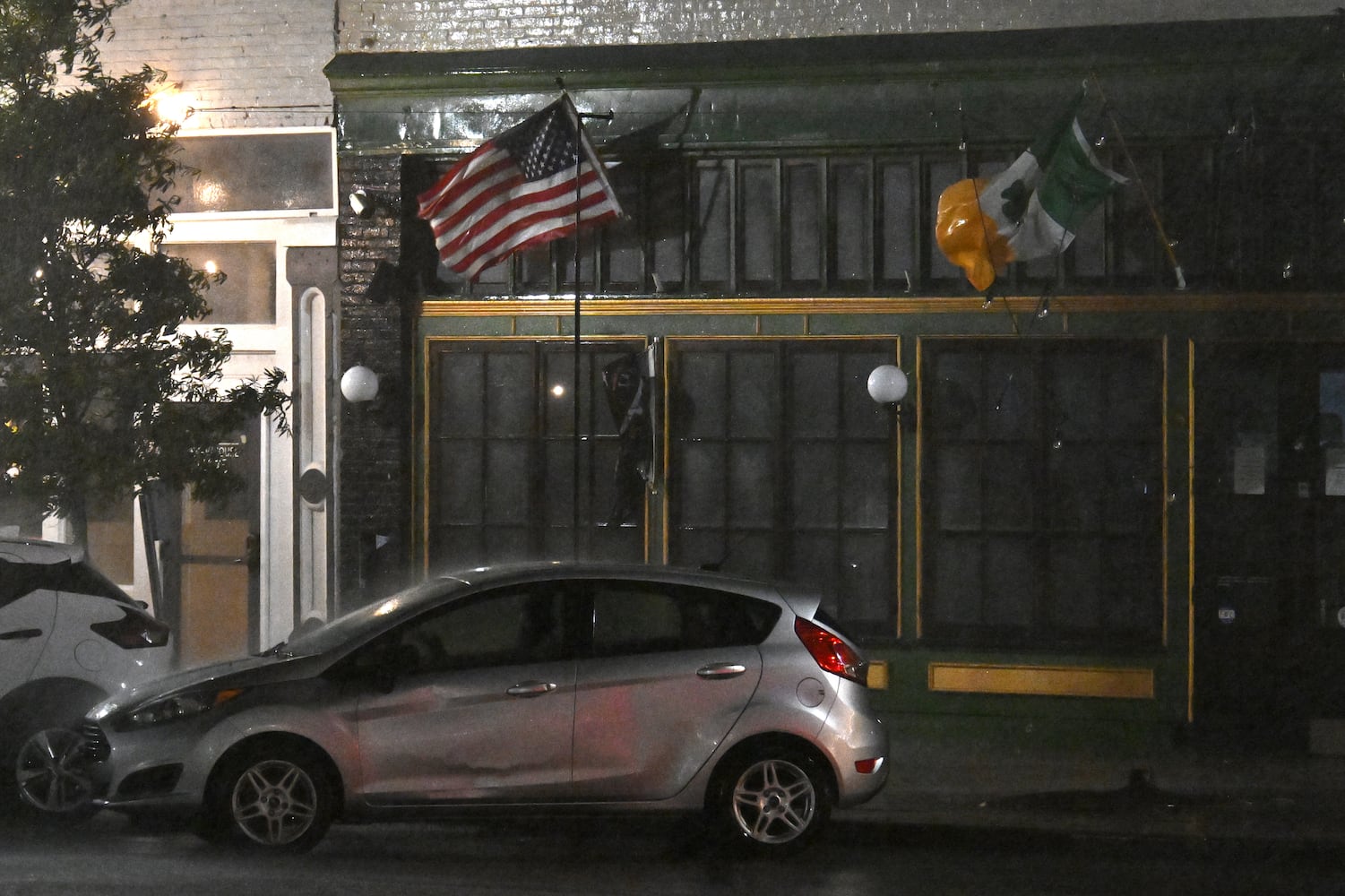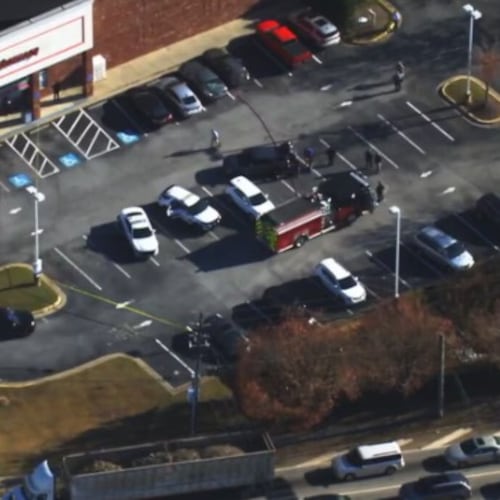Damaging Helene has swept through Georgia, leading to at least 17 deaths. All 159 counties are now assessing the devastation and working to rebuild, even as serious flooding risks linger.
The storm entered South Georgia as a Category 2 hurricane around 1 a.m. Friday. By the afternoon, Tropical Depression Helene was over northeastern Tennessee and southeastern Kentucky.
In Georgia, it led to more than 1 million power outages statewide, downed trees and destruction to several homes. Gov. Brian Kemp said a first responder was among the 17 confirmed fatalities.
While metro Atlanta seems to have avoided the worst of the storm, the risks of falling trees and flooding persist.
Ryan Willis, a meteorologist at the National Weather Service in Peachtree City, noted that the massive storm drifted along the eastern edge of the forecast cone. That left most of the metro area on the storm’s weaker, western side, leading to lower wind speeds compared to areas like Augusta. Most of metro Atlanta still saw gusts of around 35 to 45 mph, Willis said.
Atlanta’s northern neighborhoods, such as Buckhead, suffered the worst of the flooding, while other areas like English Avenue, Vine City and Peoplestown — usually most susceptible to storms — avoided the floodwaters, Mayor Andre Dickens said. No injuries or deaths have been reported in Atlanta.
[8:30 a.m.]: Georgia Power said more than 445,982 customers were without power Sunday morning after Helene left a train of destruction across the state.
Nealy 150,000 of those customers were from the southeast Georgia areas of Savannah and Brunswick amid fierce winds and flooding from the powerful storm. In South Georgia, officials said 20,000 people were still without power in the areas of Valdosta and Waycross. Thousands of customers near Dublin, Statesboro and Vidalia were also looking to get their power restored. In metro Atlanta, only a few dozen outages were reported on Sunday morning after Helene left thousands of customers without power over the previous two days.
[8:05 a.m.]: Atlanta received 11.12 inches of rain over a 48-hour period as Helene barreled through the area, the most recorded since 1878, according to Georgia’s Office of the State Climatologist.
The rainfall in the city beat out the previous record of 9.59 inches in 1886, the office stated. It comes after August tied for the third driest month in Atlanta since 2002.
[4 p.m.]: President Joe Biden released a statement about Hurricane Helene, saying that he and Vice President Kamala Harris are focused on life-saving and life-sustaining efforts.
“The road to recovery will be long, but know that my Administration will be with you every step of the way. We’re not going to walk away. We’re not going to give up. As we turn toward recovery efforts, we will make certain that no resource is spared to ensure that families, businesses, schools, hospitals, and entire communities can quickly begin their road to rebuilding,” the statement reads.
[3:20 p.m.]: More than 25 flights at Hartsfield-Jackson International Airport were canceled, most of them to or from Asheville, North Carolina; Augusta or Valdosta, all of which were hit by Helene. Hartsfield-Jackson typically has more than 2,000 arrivals and departures a day.
Asheville Regional Airport said in a post on Facebook that all flights were canceled for the rest of the day, adding that “widespread connectivity failures in our region have impacted the airport.”
It said airlines are “experiencing technological issues that are making it difficult to operate. We expect cancellations to continue.” The airport advised travelers to check with their airline for their flight status.
— Staff wrier Kelly Yamanouchi
[3:11 p.m.]: Helene bent pine trees and utility poles like toothpicks. It littered downtown Valdosta with twisted sheet metal, blocks-long piles of tree limbs and bricks from fallen building facades.
Two days after the storm raced up from the Gulf of Mexico, power lines still sag along many of south Georgia’s roads, tangling with the pines and oaks that make navigating the region treacherous. Utility officials say it could take weeks for customers in remote corners of the state to get electricity again.
Georgia Gov. Brian Kemp confirmed during a Saturday stop to tour damage. He likened Helene to a “250-mile tornado hit” and said after surveying the destruction that it looked as if a bomb had gone off.
“This storm spared no one,” Kemp said.
— Read the full story by staff writers Caroline Silva and Thad Moore here.
[2:40 p.m.]: Parts or all of 25 Georgia state parks and historic sites were closed due to damage from Hurricane Helene. Many of the properties were without power or phone lines, according to a government alert.
The closings are concentrated on the eastern half of the state, from South Georgia to the northeast corner, following much of the path of the storm. To get a full list of all state parks and historic sites closed click here.
[2:20 p.m.]: Grovetown, a small city in Columbia County just west of Augusta, is having a cookout. City officials are encouraging locals to bring perishable meats to the Streets and Sanitation Department on Newmantown Road.
”We are feeding the community and our crews while supplies last,” the city wrote online.
More than 99% of customers in the county are without electricity, which means refrigerated and frozen items won’t last much longer.
[1:05 p.m.]: The storm that battered much of the Southeast, pummeled some of North Georgia, while barely hitting other spots that had braced for much worse.
”We were blessed,” said Marty Roberts, the emergency management agency director for Towns County. “What we were expecting and what we got were totally different things.”
Meanwhile, two adjacent counties, Rabun and Habersham, dealt with numerous trees crashing down. Parts of Rabun, “the fire department told us it looks like a bomb went off,” said Gregg Dover, a manager for the county’s 911 system. Rabun authorities also ordered an emergency evacuation of people living below a dam at Lake Rabun early Friday after officials opened a third flood on Mathis Dam, flooding a nearby road and trapping people in their communities.
By midday Saturday, in Hart County, near where I-85 crosses from Georgia into South Carolina, just seven roads were still closed after crews cleaned up trees that had fallen on at least 178 byways, according to Marshall Sayer, the county commission chairman.
In Towns, along Georgia’s border with Tennessee, the Hiwassee River crested at over 10 feet before flowing into Lake Chatuge, Roberts said. That was about a foot lower than its worst flooding ever, he said. The river went over its banks, but only flooded pastures and parts of a campground, without ever reaching campers.. And by Saturday morning, the river levels had dropped sharply.
— Staff writer Matt Kempner
[12:40 p.m.]: Among farmers in Georgia, the loss is extensive. Hurricane Helene made an “exceptionally damaging impact on farms” in South and Middle Georgia,” the Georgia Cotton Commission said. Impacted producers are reporting a 35% total loss of crops, as well as losses to farm structures, equipment and infrastructure. Gov. Brian Kemp said more than 100 poultry facilities have been damaged or destroyed, about 15 dairy farms have been affected and dozens of other facilities were impacted.
“This has been a really tough year in the agricultural industry already. Economically, agriculture is in a really tough spot. And now, we are dealing the devastation — significant devastation — of Hurricane Helene from Valdosta all the way to Augusta, as the governor already mentioned, across all agricultural commodities,” said Tyler Harper Commissioner of the Georgia Department of Agriculture during a press conference in Valdosta.
[12:20 p.m.]: At least 17 people have died in Georgia after Helene, Georgia Gov. Brian Kemp confirmed during a press conference in Valdosta. The death toll across four states — Georgia, Florida and the Carolinas — hit at least 52 by Saturday afternoon, the Associated Press reported.
James Stallings, director of the Georgia Emergency Management and Homeland Security Agency, said the death toll could rise as cleanup efforts continue due to hazardous scenarios like powerlines in flooded areas and unsafe driving conditions. He said GEMA and the National Guard are focused on getting roads cleared so health facilities can function properly and crews can restore power.
“We lose more individuals through the cleanup process due to dangerous situations ... If you don’t have necessary travel, we’re asking you, keep those roads cleared,” Stallings said, adding that a GEMA member stepped on a live power line during cleanup, leaving the soldier unconscious.
[11:45 a.m.]: Augusta-area crews continue clean up efforts a day after Helene passed through.
In Augusta, Mayor Garnett Johnson instituted a curfew overnight and the city later announced that the Richmond County Sheriff’s Office will enforce a curfew from 7 p.m. to 7 a.m. staring Saturday until further notice.
In Columbia County, a curfew was also put in place overnight. County manager Scott Johnson said the curfew allowed crews to get to work, but there is still a lot of work left to do.
”We are going to be without power for several more days,” Johnson said.
— Staff writer Jozsef Papp
[11:36 a.m.]: The electric membership cooperatives that supply power to much of rural Georgia said damage from Helene to the grid that supplies power to customers in some places was devastating.
”The damage to the supply side of the electrical grid from Helene is extensive, surpassing that of 2018′s Hurricane Michael in many areas, and will take longer to assess and repair,” Georgia EMC, which represents 41 Georgia cooperatives, said in a news release. “The damaged transmission lines and substations must be repaired before electricity will be available to run through residential lines.”
About 320,000 EMC customers in Georgia remain without power. That figure is down from about 435,000 on Friday. Georgia EMC said that roads must be cleared and flooding must recede for crews to access damaged power equipment to make repairs. Georgia Transmission, the corporation that runs high-powered distribution lines and substations, reported that 30 of the more than 100 substations knocked out by Helene were back online.
”Because of the extended time it will take to restore power in this complex situation created by Hurricane Helene, those who are medically fragile or have other critical electricity-dependent needs should consider temporarily seeking shelter in other areas that were less affected by this storm,” Georgia EMC said.
Georgia Power, the state’s largest utility, which serves more than 2.7 million customers statewide, reported that about 500,000 customers were still without power.
— Staff writer Scott Trubey
[11:30 a.m.]: After Helene’s destructive march through the state, many homeowners, renters and vehicle owners will need to file insurance claims. Insurance companies will send claims teams to affected areas. Many insurers have mobile apps or online portals to get the process underway.
— Read our story here to learn what you have to do if you’ve suffered property damage.
[11:15 a.m.]: Hurricane Helene ravaged Augusta as part of its destructive path, causing buildings to be destroyed and a great number of trees to fall. The storm caused unspecified damage to Augusta National Golf Club, home of the Masters.
The club issued a statement from Chairman Fred Ridley.
“Our Augusta community has suffered catastrophic and historic impact from Hurricane Helene. We currently are assessing the effects at Augusta National Golf Club.
— Read the full story by staff writer Chris Vivlamore here.
[11 a.m.]: The death toll associated with Hurricane Helene has risen to at least 52 across Florida, Georgia, North Carolina, South Carolina and Virginia, The Associated Press reported.
[9:35 a.m.]: Augusta Regional Airport, which closed to commercial flights Friday, posted on Facebook that due to Hurricane Helene it lost its primary power and has been using its auxiliary power. It said critical systems are affected, while airport personnel are also dealing with power outages, problems with road access and property damage.
The August airport said it would continue the suspension of commercial flights until Saturday evening, when Delta and American flights are scheduled to fly in. Then, it plans for normal operations Sunday.
Atlanta-based Norfolk Southern said high winds and heavy rains started curtailing or stopping train movements in Florida and South Georgia before Helene made landfall, and it activated its emergency response plan to get routes and facilities back online when safe. It told customers as the hurricane was intensifying to prepare for shipment delays of at least 72 hours through the Southeast and Mid-Atlantic.
— Staff writer Kelly Yamanouchi
[9:30 a.m.]: Hurricane Helene caused dozens of deaths and billions of dollars of destruction across a wide swath of the southeastern U.S. as it raced through, and more than 3 million customers went into the weekend without any power and for some a continued threat of floods, according to the latest reports from The Associated Press.
Western North Carolina was essentially cut off because of landslides and flooding that forced the closure of I-40 and other roads. According to an AP News tally, at least 44 people were killed in Florida, Georgia, North Carolina, South Carolina and Virginia.
The storm, now a post-tropical cyclone, was expected to hover over the Tennessee Valley on Saturday and Sunday, the National Hurricane Center said.
[8:45 a.m. Saturday]: Power outages remain widespread, with just under 800,000 customers without power across Georgia.
Georgia EMC members, which mainly serve rural areas, reported about 336,500 outages, mostly in South, Middle and east Georgia. Nearly half a million of Georgia Power’s 2.7 million customers are without electricity due to the hurricane in the same areas.
Georgia Power said that they have more than 14,000 personnel working to restore power and are bringing in crews from other states.
”The response force currently engaged is larger than the company’s response to other major hurricanes including Michael, Irma and Zeta,” the company said.
[8:20 p.m. Friday]: The death toll in Richmond County has risen to five, coroner Mark Bowen confirmed. Each death occurred after a tree fell through a residence at five separate locations. Those killed have not been publicly identified.
[8:10 p.m.]: Valdosta State University, like much of Lowndes County, was without power Friday. Several buildings sustained roof damage. Many trees have fallen on campus. Debris is widespread.
The school told The Atlanta Journal-Constitution it has canceled in-person classes next week. It hopes to conduct virtual instruction Wednesday if electricity is restored. Repair work has begun, university officials said.
“The damage we have sustained is extensive, seemingly more than Hurricane Idalia a year ago,” Richard Carvajal, the university’s president, said in a statement. “Thankfully, we have been here before, and we know how resilient our campus community is. Our team is working hard to do what is necessary to restore our campus and resume classes soon.”
Read our past coverage on Hurricane Helene as it made landfall in Florida and began moving north into Georgia.
Credit: Contributed
Credit: Contributed
— Education editor Eric Stirgus
[8 p.m.]: Students in some metro Atlanta counties will be heading back to school Monday. School districts opening back up include Atlanta, Cherokee County, Clayton County, Cobb County, DeKalb County, Fulton County, Gwinnett County, Henry County, Marietta and Rockdale County.
[7:20 p.m.]: Gov. Brian Kemp, First Lady Marty Kemp and several other public officials will tour the damage in Valdosta and Lowndes County and meet with those heavily impacted by Hurricane Helene on Saturday. A news conference will be held after the tour.
[7:05 p.m.]: Nearly 1 million Georgians remain without power, according to data from Georgia Power and Georgia EMC, which represents 41 electric membership cooperatives in the state.
Roughly 616,000 of Georgia Power’s 2.7 million customers are without electricity after Hurricane Helene lashed the state. The largest numbers of outages are clustered around metro Atlanta, Savannah, Augusta and Valdosta. Georgia EMC members, which mainly serve rural areas, reported an additional 370,000 without power.
[7 p.m.]: Emergency workers and others are still trying to sort out the mess and pain left by Hurricane Helene in Georgia.
In Lincoln County, workers were on scene at a rural area in the south end of the county trying to determine if anyone was hurt after a tree toppled onto a home, according to county Commission Chairman Walker Norman. Perhaps 15 homes in Lincoln may have been struck by falling trees, he said, adding that the damage in the county is “terrible.”
”Small county. Limited resources. Running on two ambulances. No hospital. There’s no power .... I don’t know if any corner of the county has any electricity,” he said.
Many of the fallen trees are still wrapped up in power lines, meaning officials can’t mess with them.
“I’ve never seen nothing like it,” Norman said.
— Staff writer Matt Kempner
[6:20 p.m.]: When Cobb County firefighters made their way to Mableton’s Fontaine Road on Friday, the scene was murky. An opaque pond of ceaseless rain and runoff had taken over the street, and a vehicle — brake lights still beaming — could be seen half-submerged near its center. The driver, still inside, needed rescuing.
Since Hurricane Helene began flooding Georgia, this has become a typical scene for the Atlanta area and the state beyond.
As seen during the 2005 devastation of Hurricane Katrina, mold is a common problem after severe weather, particularly when flooding is involved. The microscopic fungi was implicated in the deaths of four Southern University at New Orleans professors because of that storm’s floods. Two months after the catastrophe destroyed much of New Orleans, the Atlanta-based Centers for Disease Control and Prevention discovered mold in the walls of half the 112 water-damaged homes investigated. Following cleanup efforts, thousands more were discovered to be affected.
It’s a long-lasting problem for storm victims that comes with severe health risks, and it could impact those in the Peach State.
— Read the full story by staff writer Hunter Boyce here.
[6 p.m.]: The death toll in Georgia has now risen to at least 15 people from causes related to Hurricane Helene, state officials confirmed. The death toll across four states — Georgia, Florida and the Carolinas — hit 40, the Associated Press reported.
Among those killed was a first responder. Vernon “Leon” Davis, the Blackshear Fire Department’s assistant chief, died when a tree fell on his city truck shortly before 1:30 a.m. Friday, Pierce County Coroner William Wilson confirmed. He was responding to storm calls when he was killed, Wilson said.
— Read the full story here.
[5:22 p.m.]: U.S. Secretary of Health and Human Services Xavier Becerra declared a public health emergency for Georgia on Friday. He said emergency personnel would be sent to all four states affected by Helene to address health impacts.
His office reported that 200 medical providers and disaster management workers were already positioned in Florida and Alabama, with more on the way to North Carolina.
In a news release, HHS and the Administration for Strategic Preparedness and Response said they will find and assist Medicaid and Medicare recipients in hard-hit areas who rely on electricity-dependent medical equipment, such as oxygen or dialysis. They will also assist hospitals, nursing homes, dialysis centers and other health care facilities.
— Staff writer Laura Weaver
[5:20 p.m.]: More than 180 flights into or out of Hartsfield-Jackson International Airport were canceled Friday, according to FlightAware.
That included more than 40 canceled Delta flights, mainly between Hartsfield-Jackson and airports in Florida and the Carolinas related to the hurricane, according to the airline. In Georgia, airports in Valdosta and Augusta closed to airline flights Friday. Delta had about 900 scheduled departures from Atlanta on Friday.
Hartsfield-Jackson’s facility was minimally impacted by the storm, according to spokesman Andrew Gobeil.
— Read the full story by staff writer Kelly Yamanouchi here.
[5:18 p.m.]: If you’re dealing with the aftermath of Hurricane Helene, be sure to keep track of any personal items that were damaged by the storm.
Document and photograph all affected property, including windows, roofs, vehicles, walls and any lost personal belongings. Notify your insurance company about the damages as soon as possible.
Be cautious of scammers who may go door-to-door offering services. The Georgia Department of Insurance advises being wary of contractors who try to rush you. They also recommend not signing any documents before consulting with your insurance company.
[5 p.m.]: There are roughly 1 million Georgians without power, according to data from Georgia Power and Georgia EMC, which represents 41 electric membership cooperatives in the state.
Roughly 635,000 of Georgia Power’s 2.7 million customers were without electricity. The largest numbers of outages were clustered around metro Atlanta, Savannah, Augusta and Valdosta.
Georgia EMC members, which mainly serve rural areas, were reporting an additional 390,000 without service.
— Staff writer Kelly Yamanouchi
[4:35 p.m.]: Hurricane Helene brought wind gusts of up to 76 mph to the Savannah area overnight, downing trees, ripping traffic lights from above intersections, tearing awnings from storefronts and causing a roof collapse on a historic building in the heart of downtown.
Tornadoes were forecast as the greatest threat to Savannahians ahead of the storm’s arrival because of the coastal city’s location on the northeastern edge of the system. Tornado sirens began sounding on the suburban islands east of Savannah at 8:45 p.m. Thursday as a twister was detected off the coast of Wassaw Island, an uninhabited barrier island home to a national wildlife refuge.
Tornado sirens continued throughout the night. At one point, seven sirens were sounding simultaneously across Chatham County.
Credit: Katelyn Myrick
Credit: Katelyn Myrick
— Read the full story by straff writer Adam Van Brimmer here.
[3:52 p.m.]: South Georgia Medical Center in Valdosta might be about the only place for miles around with power after Hurricane Helene passed through.
As they deal with the patients who are discovered in the wreckage or straggle in, the 285-bed facility is on backup generators. For a few eerie minutes in the middle of the night, even one of those wasn’t working. As regular electricity lines fell, one of the building’s three generators flickered off: the one that powers the main hospital’s emergency room and the laboratories.
Emergency batteries within the ER’s lights and medical machines kicked in so the hospital could keep providing care, while the hospital’s facilities staff raced to the generators to see what was wrong, and finally got them back up, said hospital CEO Ronald Dean.
“Our team was in-house taking care of patients,” he said. “Uninterrupted.”
— Read the full story by staff writer Ariel Hart here.
[3:50 p.m.]: The Salvation Army Emergency Disaster Services team is accepting donations to help those impacted by Helene. Donations will help provide emergency aid, food, drinks, emotional and spiritual care, and long-term recovery services, their website states.
[3:17 p.m.]: Augusta Mayor Garnett Johnson declared a state of emergency for Augusta-Richmond County on Friday due to the widespread damage. There were six deaths in the Augusta area. In neighboring Aiken County, South Carolina, there were four deaths reported.
Augusta Fire Chief and EMA Director Antonio Burden said he is in contact with the National Weather Service to determine if a tornado touched down in Augusta during the storm.
Credit: Charmain Brackett
Credit: Charmain Brackett
Savannah Riverkeeper Tonya Bonitatibus said the Savannah River is at a flood stage and she expects the damage throughout Augusta to be felt for weeks — if not months — before things get back to normal.
Augusta was hit with wind gusts up to 80 mph early Friday morning. Reports of flooding, downed trees and power lines are widespread in the area. More than 145,000 Georgia Power customers are without service in Richmond and Columbia counties.
— Staff writer Jozsef Papp
[3:09 p.m.]: State education officials are reporting roof leaks, power outages and light poles blown over at schools in metro Atlanta all the way south to Bibb County. No structural damage has been reported.
Oglethorpe University said it had minor leaks and water damage. The Brookhaven school said it temporarily lost power, but it has been restored.
— Staff writer Martha Dalton
[2:58 p.m.]: A 58-year-old Dublin man was killed early Friday when massive pine trees blown over by Helene crashed through the roof of his house, Laurens County Coroner Richard Stanley said. He was identified as Charles Douglas Brownlee, and lived in a house that at least four giant pines keeled over on in a particularly hard-hit section of town near the city’s high school football stadium, the Shamrock Bowl.
A 48-year-old Kentucky woman died when the 18-wheeler she and her husband were traveling in was struck by a wind-blown falling tree along U.S. 441, about 20 miles south of Dublin. Stanley identified the woman who was killed as Angela Edwards of Eddyville, Kentucky. The coroner said the truck Edwards and her husband were in hit a tree in the highway. Before they could move that tree, another toppled onto Edwards.
Credit: Joe Kovac
Credit: Joe Kovac
— Staff writer Joe Kovac Jr.
[2:52 p.m.]: Atlanta received an “unprecedented” 11.12 inches of rainfall in the past 48 hours, breaking the previous record of 9.59 inches in 1886, said Georgia’s State Climatologist Bill Murphey. Helene added to the 4 to 6 inches of rain Atlanta had already received by Thursday afternoon, he said. Murphey explained that the saturated soil loosened tree roots and Helene’s wind gusts weakened tree limbs.
”You get 20-25-mph winds sustained for a brief period of time, then any of those trees already weakened from the root system could still come down,” he said.
— Intern writer Caleb Groves
[2:45 p.m.]: Morgan Falls Dam is flooded at Bull Sluice Lake near Morgan Falls Overlook Park.
[2:41 p.m.]: At least six people are dead in the Augusta area.
Richmond County Coroner Mark Bowen confirmed three deaths due to fallen trees in Augusta. In neighboring Columbia County, a person died in Grovetown after a tree fell on a mobile home, news station WRDW reported. In Washington County, a 7-year-old boy and a 4-year-old girl died after a tree fell on their home and trapped them inside the burning house, WRDW reported.
— Staff writer Jozsef Papp
[2:40 p.m.]: Jimmy Carter’s hometown of Plains largely dodged Helene, which struck just before Saturday’s Peanut Festival and upcoming celebrations tied to the former president’s 100th birthday. Officials prepped for problems and ordered a curfew overnight and into the morning, thinking Plains would be hit worse.
They had concerns about what the storm might mean for locals. Also seemingly at risk: the one-day Peanut Festival that is the city’s biggest annual event. Organizers say the events will go on as planned, both in Plains and in Atlanta at the Carter Center, which lost power during and after the storm.
— Staff writer Matt Kempner
[2:32 p.m.]: Peachtree Creek is flooding neighborhoods in Buckhead around the Bobby Jones Golf Course.
[2:10 p.m.]: Hurricane Helene made an “exceptionally damaging impact on farms” in South and Middle Georgia,” the Georgia Cotton Commission said. Impacted producers are reporting a 35% total loss of crops, as well as losses to farm structures, equipment and infrastructure.
“Losses will be in the hundreds of millions of dollars. Losses will extend well beyond the farm, as cotton gins, other agribusiness and rural communities will feel the ripples of Hurricane Helene’s aftermath for years to come,” the commission said.
[2 p.m.]: Mayor Andre Dickens declared a state of emergency for Atlanta.
“Due to the devastating impacts of Tropical Storm Helene, including significant flooding and power outages, I am declaring a state of emergency for the city of Atlanta, effective immediately. This declaration will allow us to access vital federal and state resources to expedite our recovery efforts and ensure the safety and well-being of all Atlanta residents,” Dickens said.
[1:44 p.m.]: Helene toppled trees on roughly two dozen roads in Athens, but Mayor Kelly Girtz expressed relief when comparing the damage to Elbert County and Augusta.
”It is not bad here,” Girtz said, noting that about 10% of residents lost power early Friday morning.
No signs of damage were evident during an Atlanta Journal-Constitution reporter’s drive through the heart of the University of Georgia campus, including past Sanford Stadium and the president’s office. A university spokesperson said a few downed trees on campus were quickly removed Friday morning. No deaths or injuries have been reported.
— Staff writer Fletcher Page
[1:26 p.m.]: West Midtown resident Lashawn Gee heard a thud in front of her unit at The 500 apartments shortly before 8 a.m. She said she thought it was thunder but was nervous after realizing a large tree had fallen over her roof and the staircase that leads to her third-floor apartment.
”I felt a corner of my unit shake. I immediately put on rain boots, left out of the back door, walked to the front and moved my car because the gutters on the building had dropped and I was afraid it would damage my vehicle,” Gee said.
Three other tenants had their front doors blocked by the fallen tree. Gee, who was putting her newborn daughter down for a nap when she heard the loud noise, said she and her husband were prepared to vacate but the property managers immediately had a landscaping company arrive to remove the tree around 9:30 a.m.
”They were very expedient about it. It wasn’t the best thing to wake up because the building already needed some repairs. I’m just worried that something else could happen,” she said.
— Staff writer Christopher A. Daniel
Credit: Christopher Daniel
Credit: Christopher Daniel
[1:19 p.m.]: Hurricane Helene came knocking, but Angel Coney didn’t answer her door. For a while, she didn’t so much as peek outside. She huddled in her basement with her sons Travi, 10, and Mari, 9. The roaring wind sounded like someone stomping on their roof.
”It was awful. It was loud. Like a bomb,” Coney said. “You heard everything falling.”
The storm, or at least its eye and the brunt of what remained of its once-Category 4 force, hadn’t been expected this far east in Middle Georgia. But it crashed into Laurens County and its county seat, home to 16,000 people, and about 50 miles east of Macon at around 3 a.m. Friday. The power went out and trees crashed onto homes, cars and trampolines. Utility poles snapped.
Across the street at Coney’s place, she and her boys could only gaze at the surreal destruction in the daylight. Pecan leaves and branches littered the street. Coney said her family spent much of the night praying.
— Staff writer Joe Kovac Jr.
[1:13 p.m.]: The storm snapped power poles and brought down trees and power lines in much of the small city of Elberton in northeast Georgia, according to interim City Manager Kevin Eavenson.
The city, which operates its own power system but relies heavily on Georgia Power transmission lines, was able to restore electricity to about 20% of its customers, he said. But most of the city remains without service. It could take at least another two days to have them fully restored, Eavenson said.
At least two homes were hit by falling trees and crews responded to a house fire apparently caused by burning candles, though there weren’t reports of injuries, he said.
— Staff writer Matt Kempner
[12:30 p.m.]: In Hart County, near where I-85 crosses from Georgia into South Carolina, the storm rates as “the worst one we’ve had in years,” based on the breadth of areas with fallen trees, said Marshall Sayer, the county commission chairman.
He shared a tally of damage he learned from the county administrator: at least 178 roads with downed trees, at least eight homes and one business damaged by falling trees, about 7,000 customers without power as of 10 a.m.
According to the county administrator, no injuries in Hart had been reported, and road crews were out clearing the pavement, backed by private citizens, fire department crews and sheriff’s investigators and deputies running chainsaws.
— Staff writer Matt Kempner
About the Author
Keep Reading
The Latest
Featured
